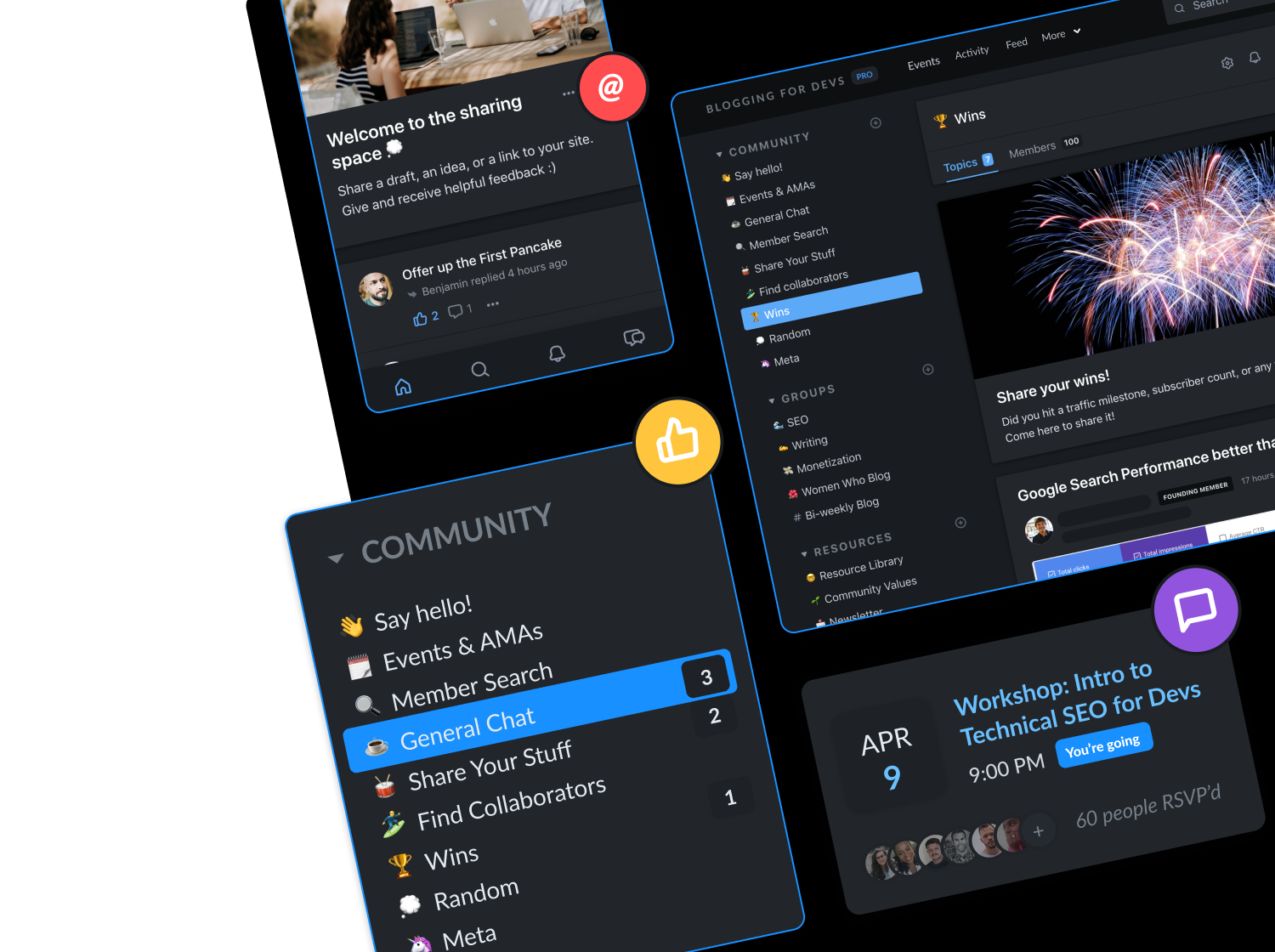17 Link Building Strategies for Startups and Developers

Monica Lent published
If you run any kind of moderately successful website, it's not long before these types of emails start showing up in your inbox:
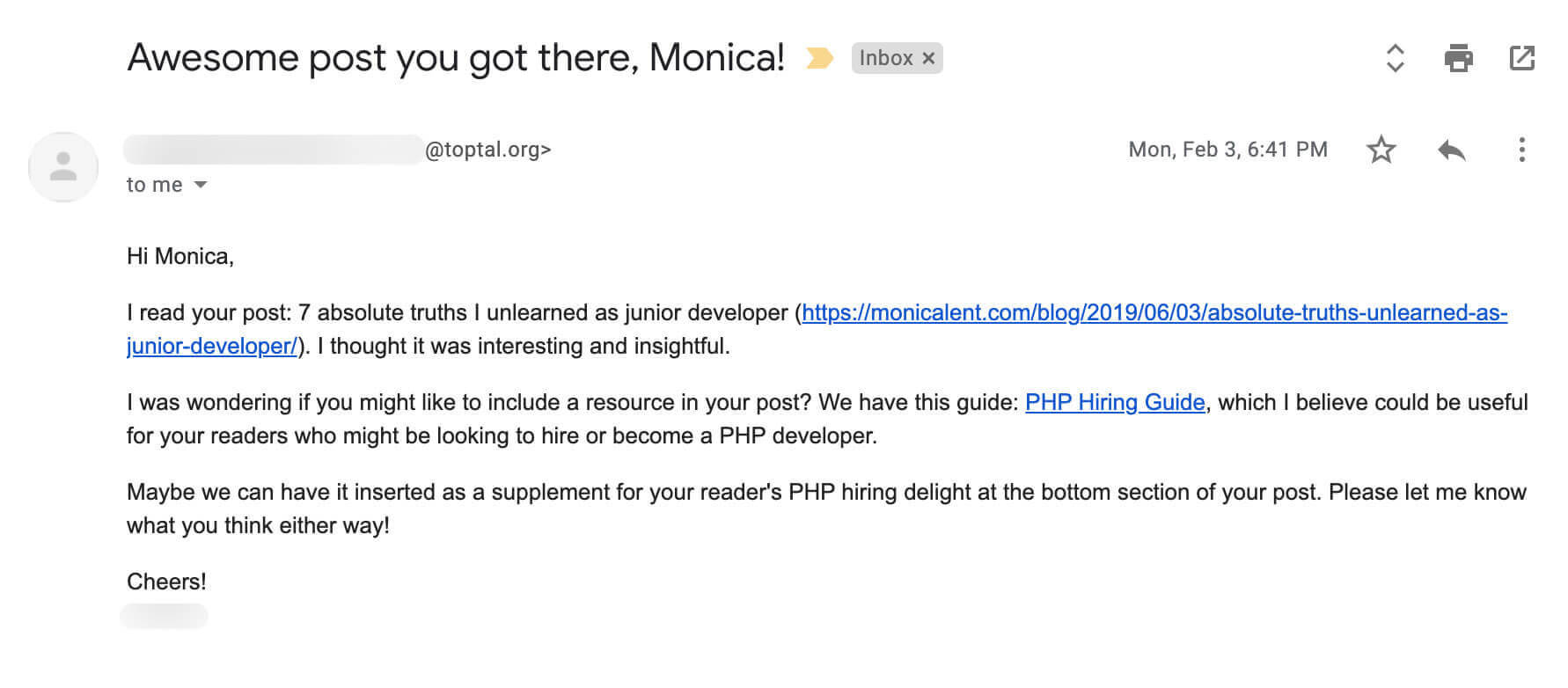
You might wonder to yourself, "Why is someone who works at Toptal suggesting that I link to a random article from one of my blog posts?"
The answer is that this person is doing something called link building.
When it comes to SEO, having external links pointing to your startup's website or your company's tech blog can help you rank higher in Google. In a big way.
In this example, Toptal is trying to rank an article about PHP hiring. And the reason they asked me to include a link to that in that specific article isn't because they actually think it's a great post.
It's because my article about being a junior developer has a bunch of external links to it. These are called "backlinks".

Whether you're a founder or creator trying to get organic traffic to your startup, SaaS, info product, or service, or a developer trying to get visitors or freelance clients on your tech blog, this article will put you on the path to do just that.
You are about to learn how to build these coveted backlinks to your blog or website, why they are so important for SEO, how to figure out which websites and pages offer links that actually help you rank, and 17 specific strategies for building them that work.
Most importantly, you'll be able to do all this without suggesting irrelevant resources or creating more spam in bloggers' inboxes (sorry, Toptal).
Why backlinks are so important for SEO
Backlinks are important for SEO because Google treats links from external websites like an "upvote" for the quality of the content.
The more authoritative a website is (in large part, how many backlinks it has and from whom), the more "votes" it bestows upon the websites that it links to.
This is a bit of an oversimplification, but let's take a look at a concrete example.
Think about how many articles have been written on the topic of "ReactJS Tutorial".

Google has over 7 million articles indexed on the topic.
How does it decide which articles are worthy of being on the first page of the search results, much less which deserves to be number one?
Backlinks are part of the answer.
How Google chooses which articles to rank (as far as we know)
Google uses over 200 ranking factors to determine which article gets the top spot.
These include things like the presence of the keyword in the title tag and H1 tag, site speed, freshness (how recently the content was published or updated), and many other factors.
But not all factors are equally weighted.
However, time and again we observe that backlinks (especially backlinks from different domains) strongly correlate with higher rankings in Google. They may not be the most important factor, but they are important — and the data shows that.
One study of 11.8 million search results found this:
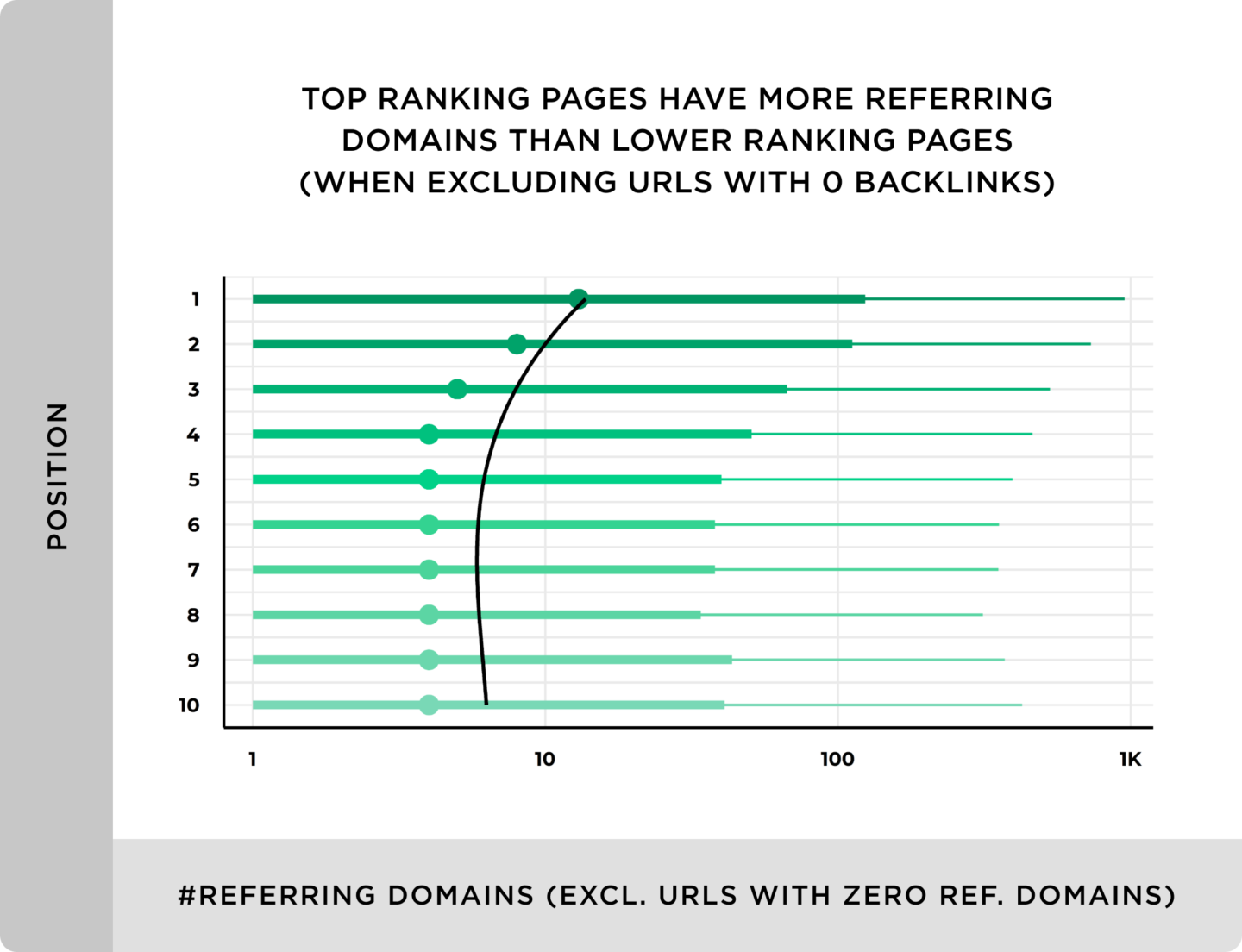
Pages with lots of backlinks rank above pages that don’t have as many backlinks. In fact, the #1 result in Google has an average of 3.8x more backlinks than positions #2-#10. (Source)
Here are three reasons why links can be an effective way for Google to determine which article among millions is the best:
- They're hard to get. Quality backlinks from authoritative websites are difficult to obtain (meaning, difficult to manipulate). You can't just email the New York Times and ask for a link to your blog.
- They pass along useful context. If I run a website about web development, a backlink from CSS Tricks or Mozilla Developer Network reinforces to Google that my site is about web development.
- Natural links represent a human's opinion. If someone links to an article just because they find it handy, that represents to Google that it probably contains quality information.
Let's look at the backlinks for the top-ranking articles for "ReactJS Tutorial":
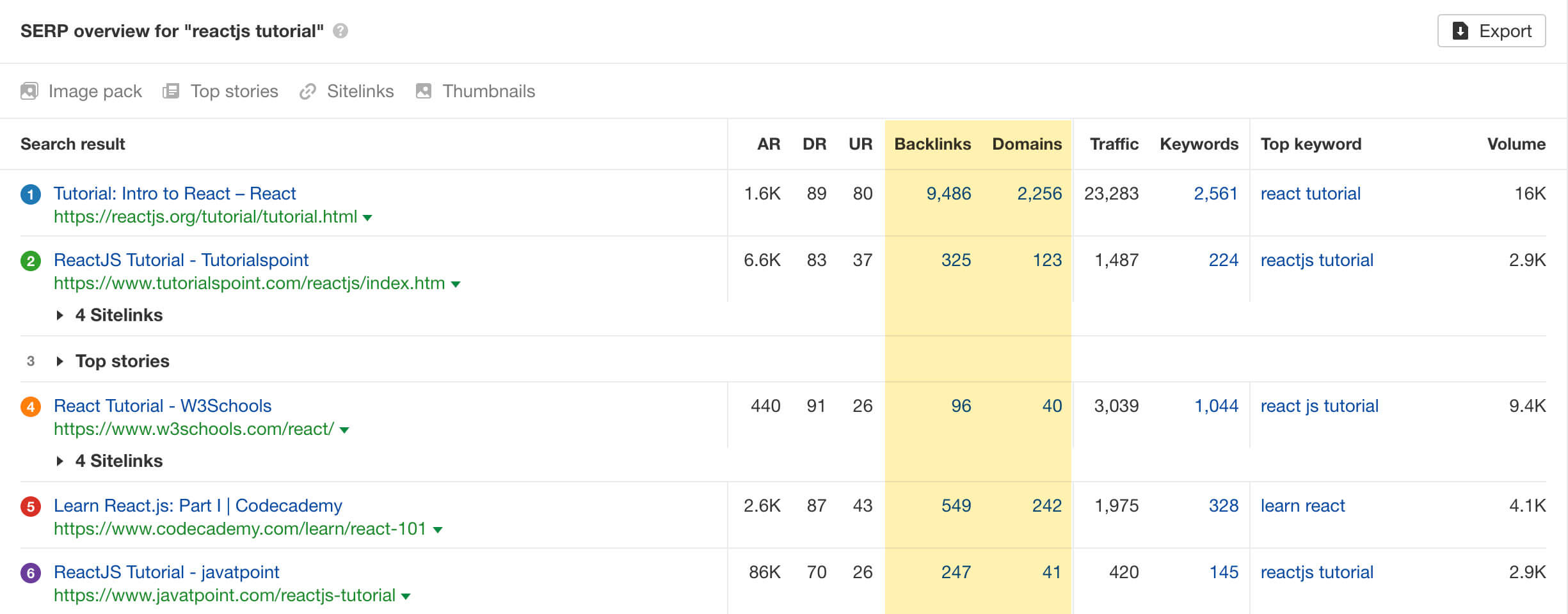
You can see that the #1 article is on the official ReactJS website and has over 9,000 backlinks from 2,000+ different domains.
This makes perfect sense: it's the official documentation, making it naturally the most relevant, authoritative, and linked-to article about "reactjs tutorial".
But what about topics that don't have a clear entity behind them?
Let's look at the kinds of queries you might pop into Google on a regular basis: CSS properties.
Have you ever wondered why W3 Schools would ever show up above MDN when you google for these?

Here's one possible explanation for you.
For fun, let's look at one last example: Toptal's article about PHP hiring.
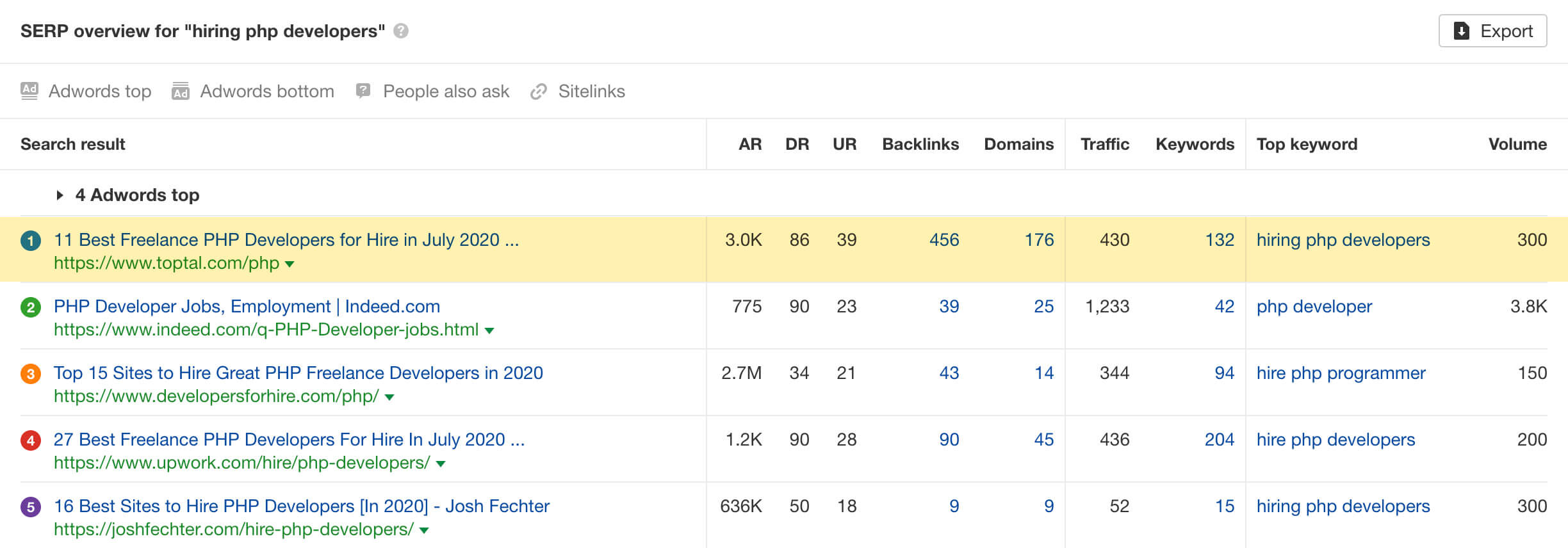
They have clearly been building links to this page, and are able to rank higher than sites like Indeed and Upwork for this search query.
Ignoring any on-site factors, it could be hard for the other sites to outrank Toptal without building more links themselves for "hiring php developers".
In effect: Backlinks have likely helped Toptal obtain their ranking for this query.
You can also imagine that the people searching for "hiring php developers" are exactly the type of people Toptal would like to convert into clients. It makes sense.
Notably, they don't rank #1 for relevant search terms with higher volume like "php developer", but I'm sure they're working on it ;)
Now the question is — how can we boost ourselves to the top of the search results for terms that will bring readers or clients to our website, at least in part through backlinks?
The most important SEO tactic that most developers have never heard of before
It's not adding a ton of obscure meta tags or making your website load faster (believe it or not, neither schema nor pagespeed appear to correlate with higher rankings).
It's link building. What is that exactly?
Link building is the deliberate effort to gain external links to your website, usually through content marketing, outreach, PR campaigns, and creating "link-worthy" articles, graphics, and tools.
Toptal's email to me is an (unsuccessful) attempt at link building.
They wrote me an outreach email, asking me to edit one of my existing articles to include a link to their website.
While the official word from Google is that you should just "create great content" and links will come, most of us are in agreement that's not how it works in the real world, especially for new websites.
It takes a concerted effort to get links.
I'll be honest: it's a lot of work.
But think about it like this: Imagine you could write an article and feel pretty confident it would drive revenue for your indie product, clients for your freelancing business, or bring you readers that will subscribe to your newsletter, follow you on Twitter, or even offer you a job...
All without you paying for ads or relying on a massive social media following.
That's why SEO in general, and link building in particular, is so powerful and important.
And while I'm the first to bemoan the fact that Google is making our lives harder when it comes to visibility in search, it's still one of the most cost-effective and scalable ways to drive traffic to a website.
And to do that, there are specific strategies you can use to get links from great websites.
Links that will, in turn, signal to Google that your content is excellent and worth showing to searchers.
I'll get to those specific strategies shortly, but first it's important to give you a few techniques for determining whether a backlink from a website will be valuable for you.
That way you don't waste your time chasing links that won't move the needle.
Why all backlinks are not created equal
Imagine that Google treated the internet like a democracy: every link from every website has one, equal vote.
If you wanted a bunch of links to your website, you could just go create a repo on GitHub with a markdown file and "send backlinks" to each page on your website you want to rank.
You could create dozens or even hundreds of repos to boost your rankings.
Or, hundreds of Tumblr pages, Twitter profiles, blogspot websites, you get the idea.
That doesn't make sense, does it? We both know you could probably code a script to automate that in less than a day (which is basically what people did).
This is similar to how Google's original PageRank algorithm used to work.
Instead of just looking at the content of your website, it also looked at how many external links pointed to the website or web page (and how many links pointed to those web pages, and so forth). How many, but not necessarily the quality of the referring website.
What it meant is that it was easy to build links (and rank your website) through spam: spam comments on blogs, on forums, low quality sites created as so-called "link farms".
That's why Google introduced measures to rank based on the quality of links, starting with the so-called Penguin Update in 2012.
Today, if you want links that are likely to improve your website's rankings, you should look at a few factors first.
How to tell if a backlink is useful for your website (or a waste of your time)
Since I told you that building links is a lot of work, I want to make sure you're spending your time efficiently and getting the most out of your effort.
We're going to look at backlink strategies, but it's important that for each strategy you apply, you look at the specific website you'd be earning the link from and evaluate it.
Here are some of the most important factors to consider when deciding to pursue a backlink opportunity.
Some confirmed by Google, some denied (but that doesn't necessarily mean they aren't accurate).
- Relevance — Is the website covering the same topic as yours? Again, a link from CSS Tricks to my article about "CSS Grid" would probably be more valuable than a link from, say, a link from Webflow. But both are more relevant than a link from, say, the Financial Times, even if the latter is highly reputable (of course, don't turn down a link from the FT either).
- Domain-level Authority — Does the website linking to you have a lot of backlinks themselves? And if so, what's the quality of those backlinks? One useful metric for estimating this is Ahrefs Domain Rating (DR) (bearing in mind, this is a third-party metric not actually included in Google's algorithm).
- Page-level Authority — Does the specific page you'll be getting the link from have a lot of backlinks from reputable websites? This is probably what Toptal was looking at when they decided to reach out to me for a link.
- Traffic — Does the website and web page get traffic? If a website is ranking for a term with search volume, this is a good indication that Google "likes" the website and sees it as trustworthy.
- Location — Where will the link be placed? And is it likely to get clicked? There is a lot of speculation about the best location for a backlink, but in general spots like the home page or early in the content of a relevant article are excellent locations.
- Outbound links — How often does the website link to external sources? How many other links are on the same page as yours? In both cases, fewer is better because it means your backlink will be worth more.
- Followed links — Your backlink should NOT have a
rel="nofollow"attribute, which is essentially the author's way of telling Google they don't endorse your content. Most links like this are "pointless" or only serve to forward referral traffic, but will not help with ranking. - Anchor text — Ideally, the keywords you want to rank for are in or near the anchor text to your article. For example, a link like
<a href="https://mywebsite.com">my keyword</a>is a better link than<a href="https://mywebsite.com">click here</a>. However, you don't want to overdo this because it can appear unnatural (and thus be ignored) to Google. - Link diversity — Don't focus all your efforts on getting links from ultra high DR websites. This usually isn't a problem because low quality sites will link you anyways, but it's still good to get a mix of links. It will appear more natural. Diversity comes in many forms, like diversity in anchor text, link locations, referring domains, links to your homepage vs links to articles, etc.
I'm sharing all of this with you, not to overwhelm you but to make sure you don't waste your time on building useless links.
Because one high quality link can have a much bigger impact than a dozen or even a hundred low quality ones.
Let's look at how to get some of those quality links, then :)
17 Link Building Strategies for Developers and Tech Founders
You might find it hard to use all of these strategies. And that's totally OK.
What you can do instead is try them, and pick the ones that seem to work well for you.
Then double down and do more.
The strategies that work best for you will depend on the website you want to rank, the topic you're writing about, whether you have other websites or a social following to leverage, the industry your product or project is in, and so forth.
But there are options for everyone! So find a few that work for you.
Let's go.
Get interviewed by your company
Tech companies love featuring their employees. In short: It makes them look good. Happy employees are great for employer branding and hiring efforts.
Here's an example where I was interviewed by the company where I worked for five years, called SumUp.

SumUp is a German FinTech company that's been around for a while. They've been featured in TechCrunch numerous times, ranked #1 on the European Inc 5000 list in 2018, and officially made it into "unicorn" territory (meaning, valued at over $1B dollars).
If you've been into SEO for any amount of time, you'll get where I'm going with this:
They've got a decent domain rating and could be a very helpful link for me.

In general, a lot of tech company websites end up with great domain authority:



You get the idea. Next time they need a volunteer to be featured on the company blog, nominate yourself and ask for a link to your website.
The content writer won't care, they'll just be happy someone agreed to do it.
If you work somewhere chill, the SEO at your company might even think you're crafty for coming up with the idea.
Bonus tip: Contribute to your company's engineering blog
We both know they're desperate for developers who are willing to write and would be thrilled to have you contribute.
So assuming your company's engineering blog isn't hosted somewhere like Medium (or sequestered on subdomain), getting a link from your company's tech blog inside a relevant article could be the absolute easiest backlink you can get from a high authority website.
Appear as a guest on a podcast
These days, everyone and their dog has a podcast. Creating or appearing on a podcast has never been easier.
What's cool about podcasts is that most of them have a section called "Show Notes", where the podcasts hosts leave links to whatever was discussed in the podcast.

Usually if you appear as a guest, your website and Twitter profile will be linked.
But you don't even have to appear yourself. You just need to be mentioned by someone else. In the example above, the guest wasn't me, it was Chris who mentioned my newsletter.

This resulted in a DR 71 link to my newsletter (thanks Chris!). Originally they linked to my tech blog instead of the newsletter, so I just wrote them on Twitter to ask them to update it, which they did.
You might think it's hard to just appear on a podcast, but there are podcasts that allow you to "pitch yourself" as a potential guest.
For example, Develomentor is a podcast that showcases people who enter tech from non-traditional backgrounds, and the host has a page called "Be Our Guest" where you can do just that.
Write something really damn interesting (and have it go viral on Hacker News)
I told you not every strategy will work for everyone, but stay with me.
While this technique is among the most effective in terms of volume of links and chance at picking up some high-value links, you might find it tricky to achieve.
And that is writing viral content.
Here's what it looks like when an article spends 36 hours locked at position #1 on Hacker News, as well as tops the /r/programming subreddit:
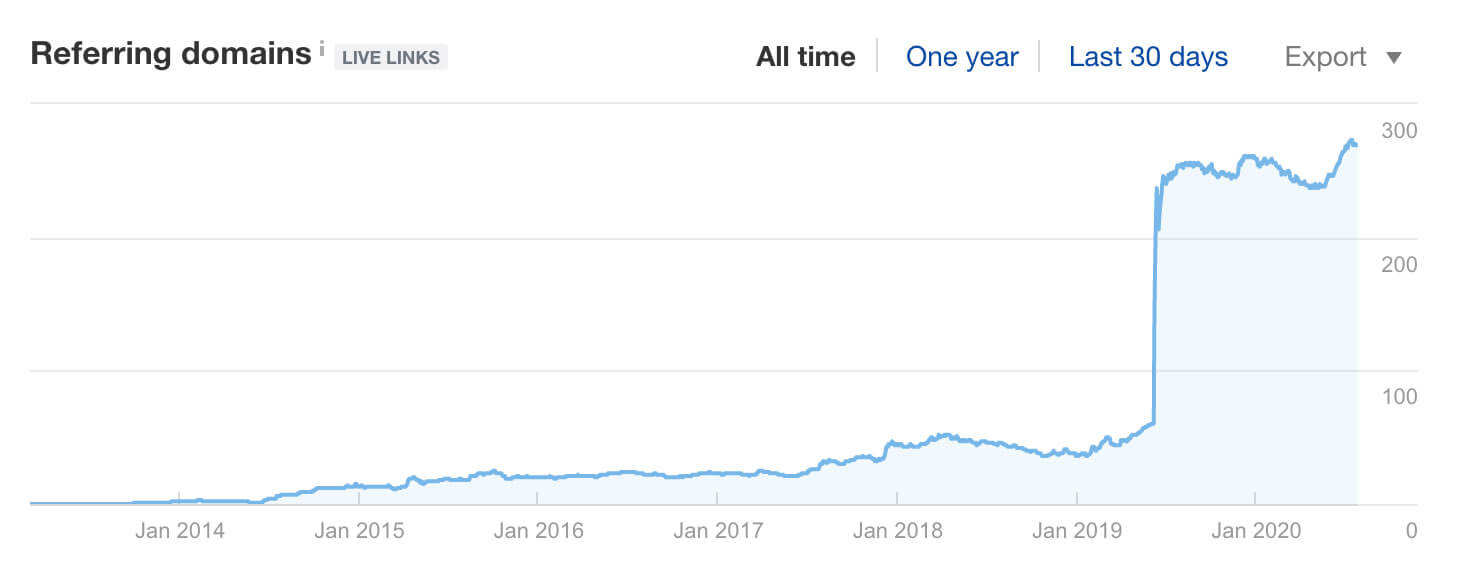
It picks up links like an industrial strength magnet.
Part of that is because so many websites scrape and link to articles that rank highly on Hacker News. Many newsletter creators also get links for their weekly round up from HN, which is later published on the web.
You don't have to read (or reply) to the comments to go viral there. I didn't.
While I can't give you a formula for for success with this technique, I can tell you why I think my article about being a junior developer did so well:
- Short, click-worthy title: "7 Absolute Truths I Unlearned As a Junior Developer"
- Controversial topic: Career development in tech
- Digestible formatting: Listicle, easy to skim with clear take-aways
- Easy to re-share: Embedded original tweet in the post
- Good content: The piece is relatable, contains jokes, is fun to read
You can also look at historical Hacker News data for an idea of themes that tend to do well.
As you get better at writing online (for example, by taking my free email course on blogging), you will develop an intuition for content that resonates with people and is likely to get shared and linked.
But let's try something that you can probably do right away...
Literally just tell someone you've already linked to them
Who doesn't love getting a shout out?
If you've linked to someone's resource, tutorial, project, or anything at all — shoot them a quick tweet or email to let them know.
They may not link to you themselves, but they may retweet your tweet, or upvote your link on Indie Hackers or Reddit, or otherwise help promote your content — thus increasing your chances someone else will see your article and link you.
This can work especially well for brands whose social media interns will share your content on their social media page. The smaller the brand, the more they'll boost you.
Plus, getting boosted by a brand is validation that invites other people to get in touch with you for activities like interviews (this has worked for me in areas outside of tech).
Speak at a conference
I realize that right now it's not the best time to say "Just speak at a conference", but there are a lot of virtual tech conferences going on right now you can probably apply to.
Now, speaking at a conference just for a backlink is a ridiculous effort-to-benefit ratio.
However I am a big believer in how much of a game-changer conference speaking can be for your career. So why not get some links in the process?

Pretty much every conference website will link to both your personal blog and your Twitter profile.
And just by being more visible through conference speaking, you can pick up other great backlinks as well, like this one from InfoQ (DR 86).

Plus, if you're applying to speak as a podcast guest or to be interviewed through HARO, having a tech talk online is great social proof that you're interesting and well-spoken.
Bonus tip for tech speakers: Host your own slides.
NEVER upload your slides somewhere like Slideshare.
Always host them on your own domain, so if the conference organizers or attendees want to reference them, they need to link to you.
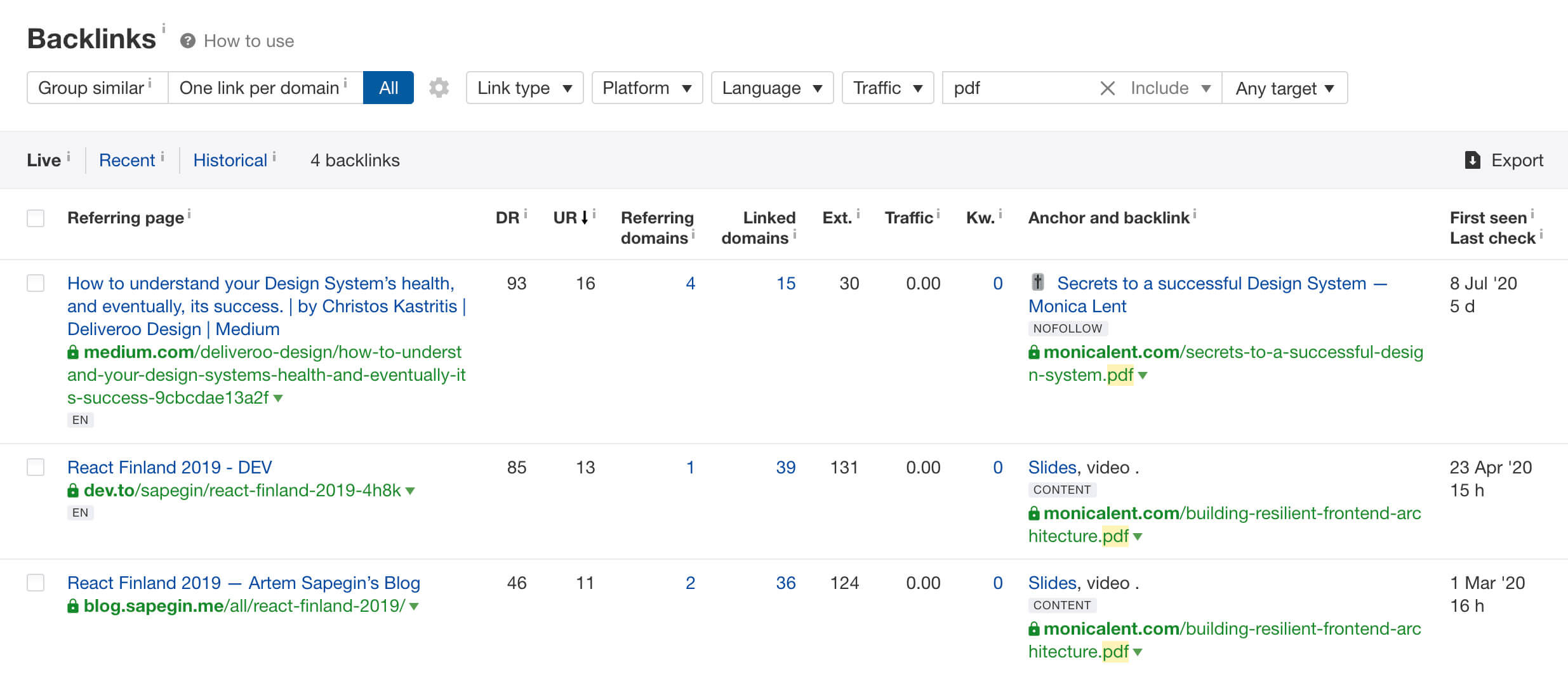
If you want to generate more links like this, you can create PDFs exclusively for the purpose of attracting links like programming or software cheat sheets.
Can't get invited to speak? Run your own (virtual) event instead.
Want an almost guaranteed way to get links to your website?
Run an event and invite people to speak at it. Since most developers have personal blogs, it's practically inevitable they'll link to your event page and encourage their friends and followers to sign up.
Just make sure to self-host it on your website instead of making another site like Eventbrite the place with information.
Speaking for myself (har har), I always link out to the conference or meetup websites where I'll be giving a talk:
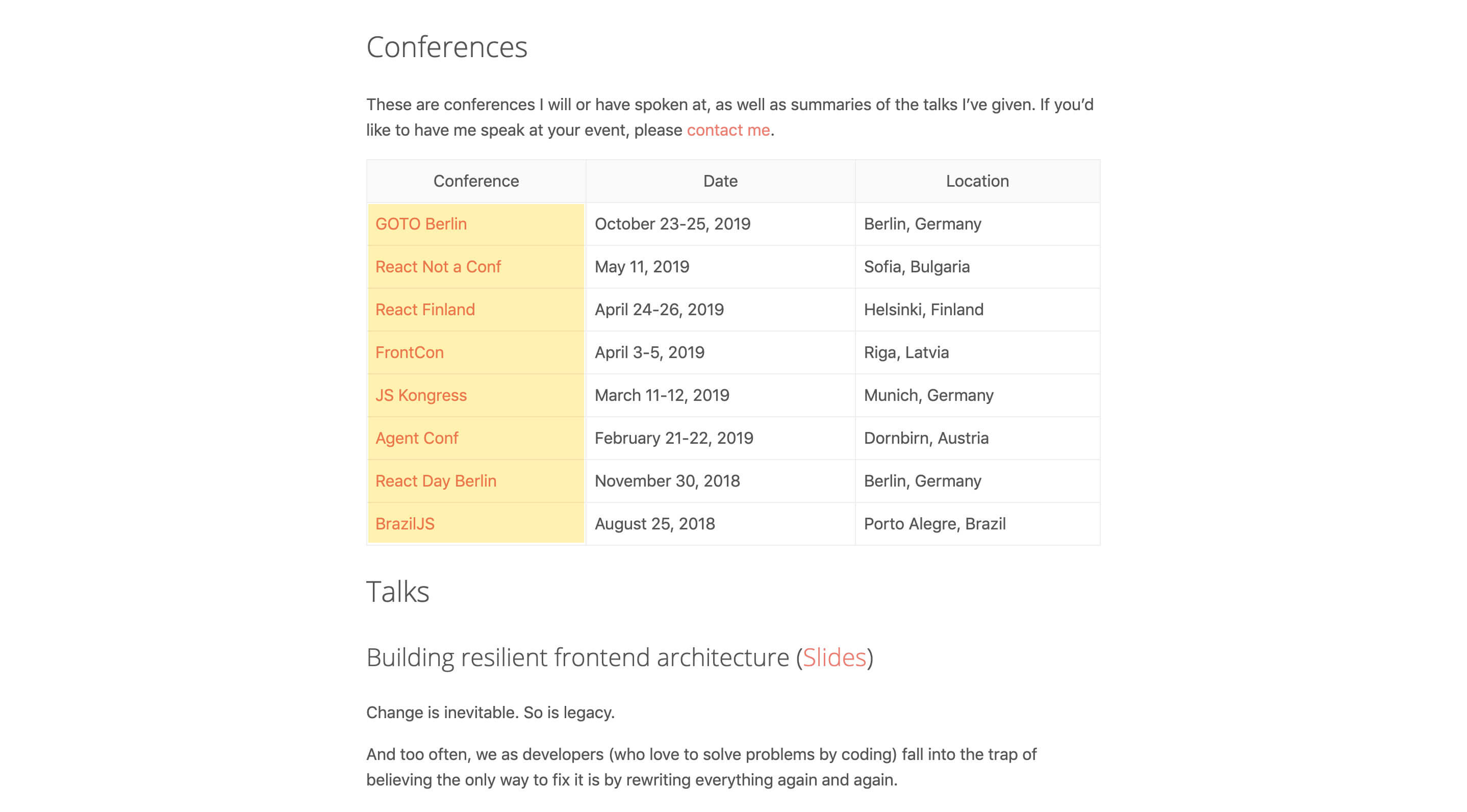
Same goes for my friends who give technical talks:
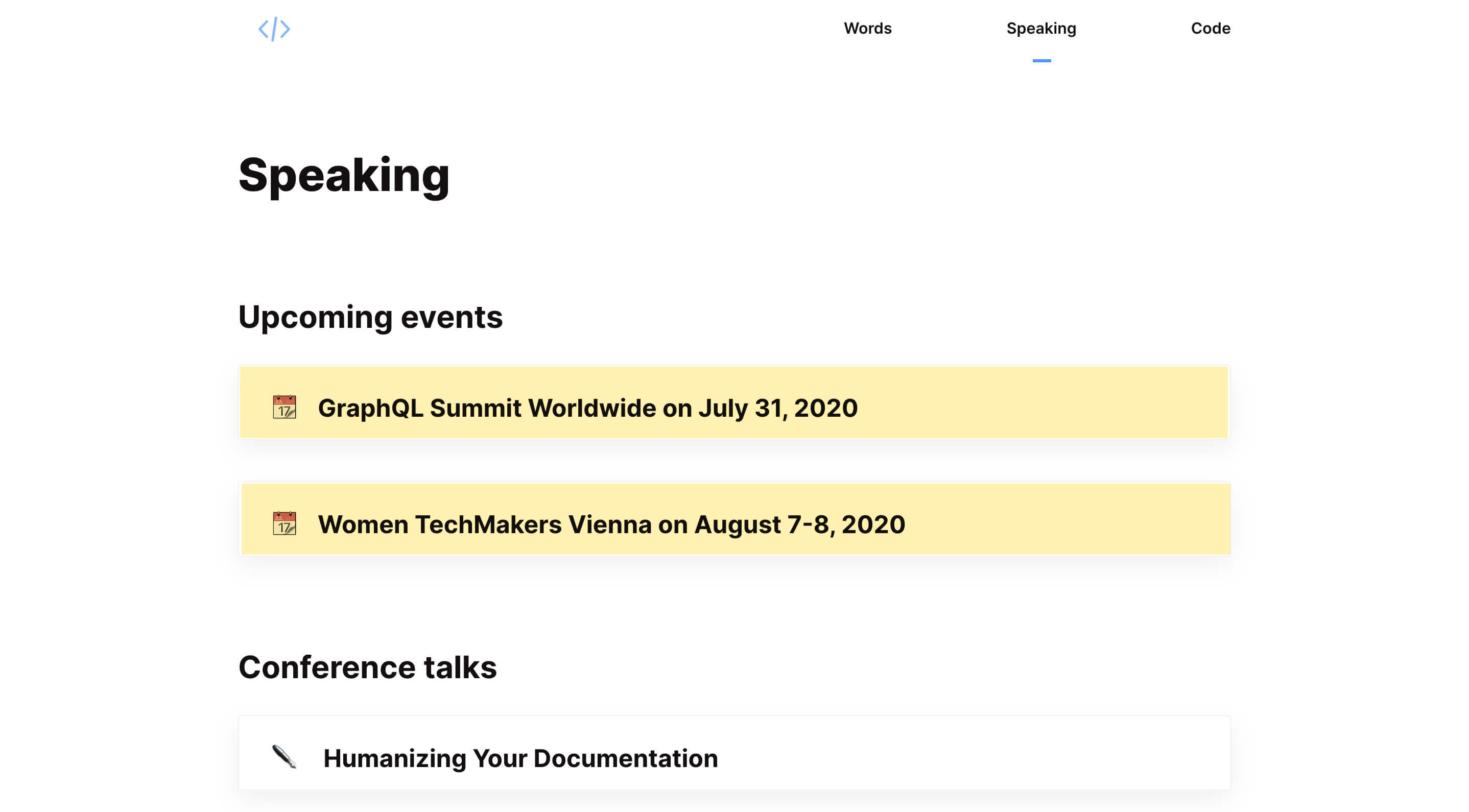
If running an entire online conference sounds intimidating, you can go for something more lightweight:
- A webinar with a single speaker
- An expert panel
- A virtual meetup
Record the talk and ideally pair it with another "linkable" page that your speakers can link to, like a podcast episode hosted on your website or a written interview.
Even if you're not running an event for developers, this can work from lots of different angles. Instead of inviting developers to speak on a technical topic, you can invite the customers of your product to join an expert panel. If you frame it right, they'll want to link you and feel proud to be included.
It's also just great for exposure and social proof, but the links are an added bonus.
(Also, please compensate your speakers and panelists for their time, thanks 🙏)
P.S. If you have the budget, you can also sponsor an event and get a link that way as well, as conferences list sponsors on their website.
Integrate your app with tools that publish (and link to) their integration partners
Integrations are a popular form of social proof, especially if the app you're building isn't exactly a household name.
Even better, integrations often appear on a website's home page, which is a prime location for a backlink.
The reason is a website's home page usually has the most backlinks pointing to it. That means, any pages linked from the home page are "passed" some of that authority it received from those backlinks.
If they're not on a home page, integrations will appear on a dedicated Integrations page which still receive a good number of links.
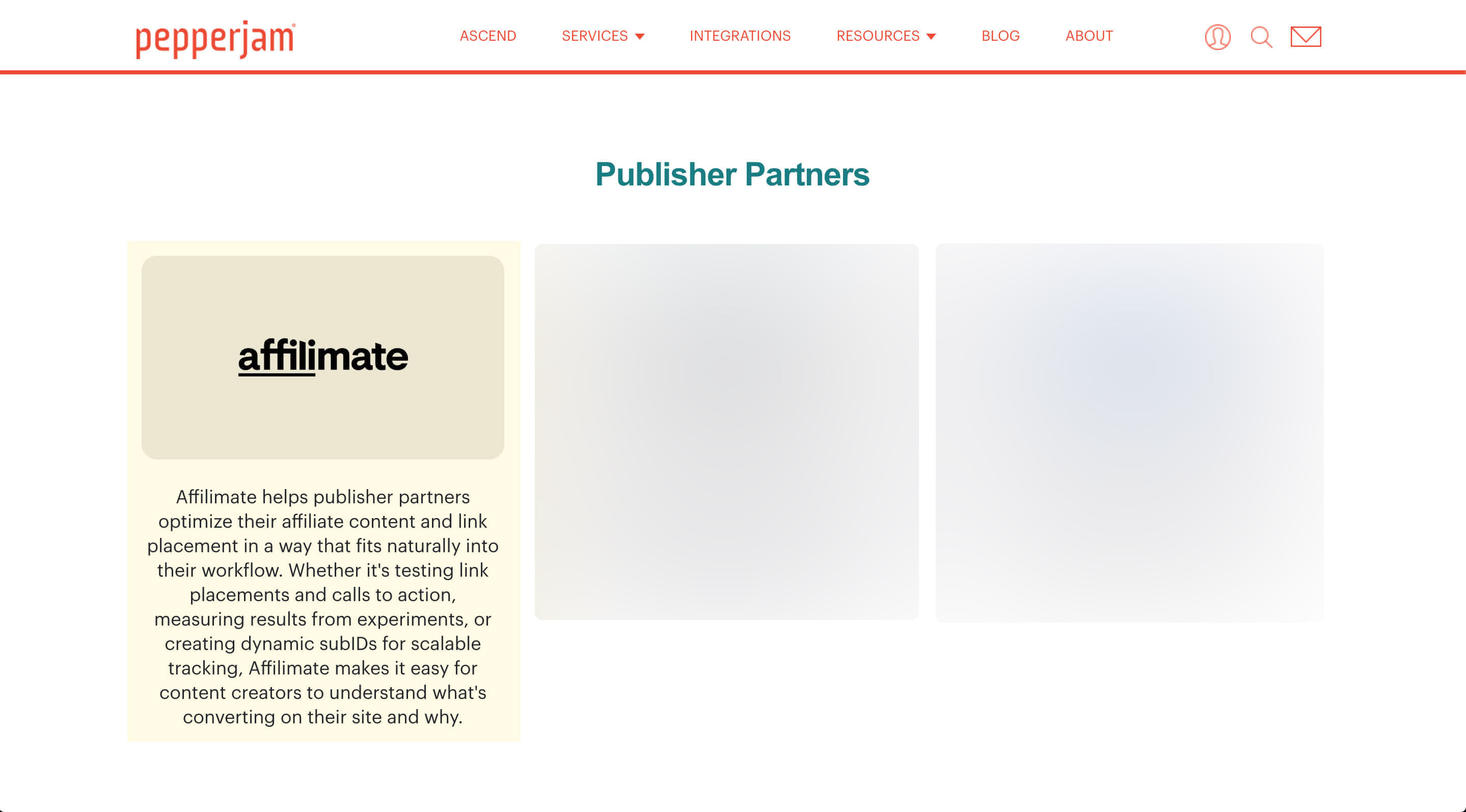
Here's an example of an integration we did with our SaaS application, Affilimate.
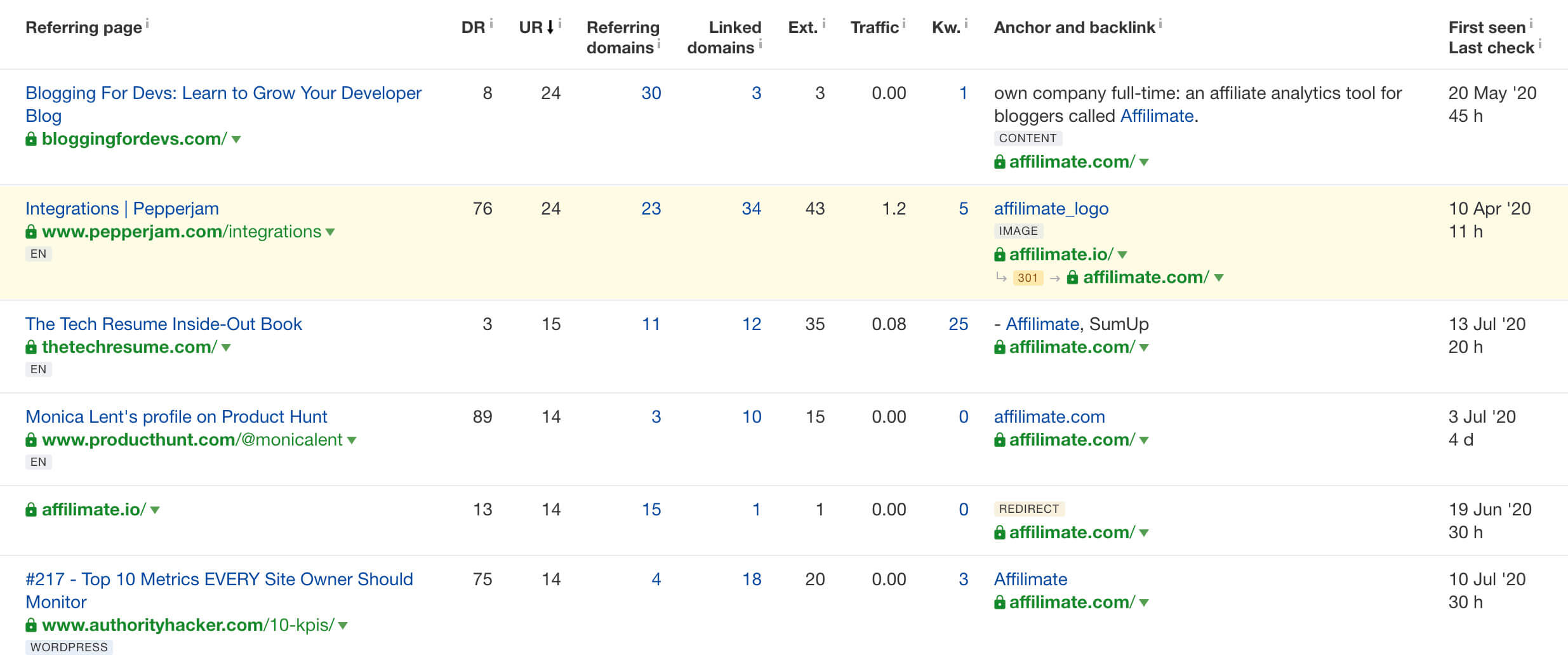
In my experience, many companies also do co-marketing with you when they launch an integration.
You could end up with a link to your site, a new integration, a mention in their newsletter or social media, or even direct access to their customer base through a joint event.
Integrations make everyone look good because it's a value-add for both sides.
With that, let's look at an easy way to get links that works for both individual bloggers and tech founders.
Find unlinked mentions of your name or product
Searching your own name in Google can be scary, but that's what I'm going to ask you to do right now.
Search for your name or the name of your product, and find places where you're not being linked but could be. Then, reach out to those people to ask them to link to you.
Since they're already talking about you, they're probably more than happy to connect and give you some credit a la links.
You can do this in a few ways:
- Google yourself and sift through the results with a query like:
"your name" -site:yourwebsite.com - Use Ahrefs' Content Explorer tool
- Use BuzzSumo
I'll show you how to do it with the first two methods.
Doing it with Google is pretty inefficient. It took me until the 7th page of search results to find a candidate for this technique:

While I'm happy that Kenneth likes my talk (thank you Kenneth if you are reading this!), most mentions on individual developer blogs won't make a huge impact for me.
What I'd really love to see are some company blogs referencing my work (remember — as I explained earlier, company blogs have been collecting backlinks for years).
This is easier to do with the Ahrefs Content Explorer because you can sort by different criteria, such as Domain Rating.
Open up the Ahrefs Content Explorer and use a query like this:
"your name or product name" -yourwebsite.com
This will search for mentions of your name that don't appear on your own website.
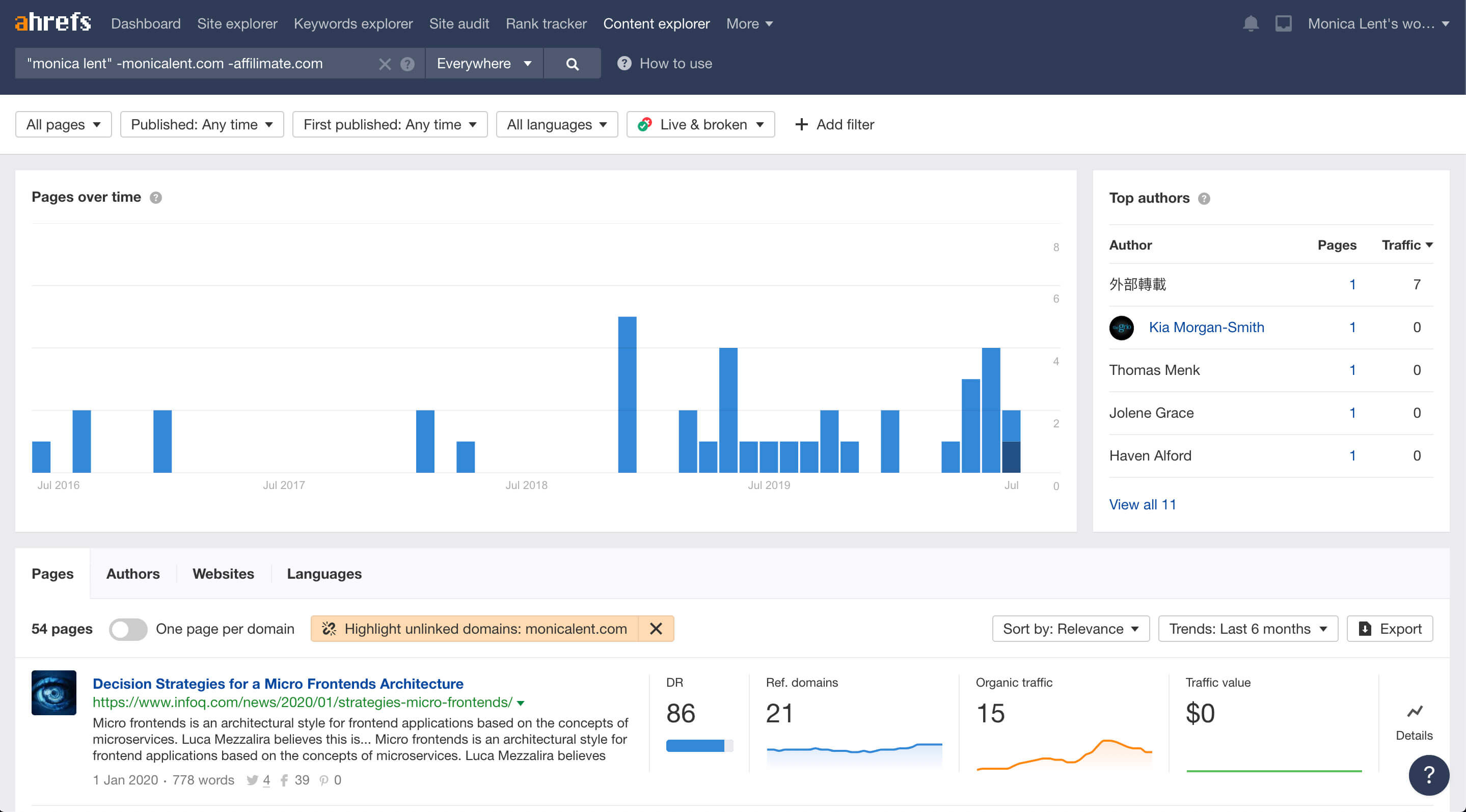
Use the option "Highlight Unlinked Domains" to easily spot domains that mention you (or your product), but don't link to you.
Now there can be false positives, in my case "Monica Lent" could be part of a sentence like "90's RnB artist Monica lent Tupac her favorite cassette tape" (and indeed, one of these unlinked mentions does refer to her).
Otherwise, I found two right away:
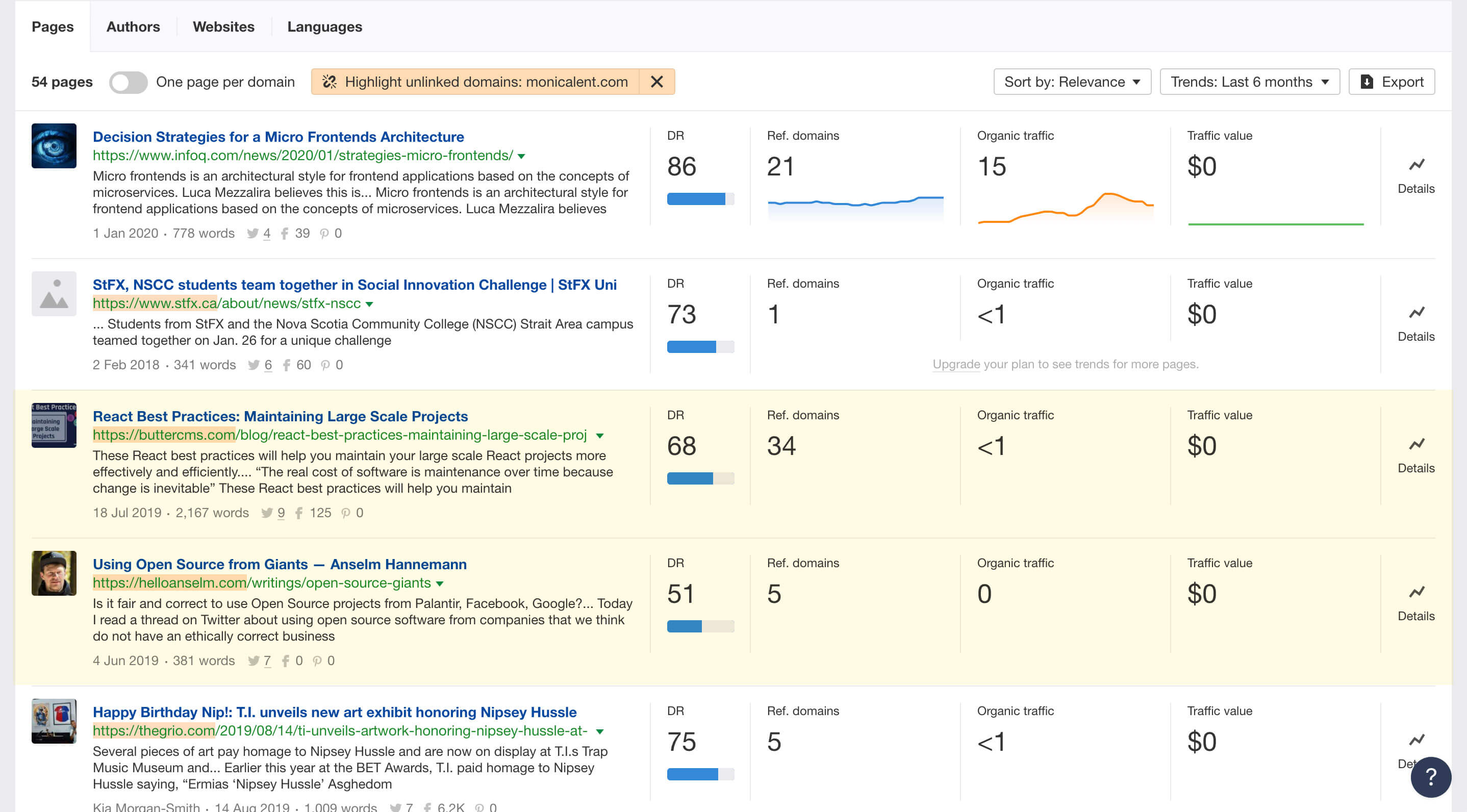
These two mentions are linking to a conference talk on YouTube and a tweet I made, respectively, but if I had relevant content on the same topics on my blog, I could easily reach out and ask them to make the swap.
Again, I don't consider this spam because clearly they already thought my content was interesting and they will probably be happy to connect.
To automate this going forward, you can use Google Alerts. Just make sure to use the Advanced Options and choose "How Many: All Results" if you have a relatively new product or website so you don't miss anything.
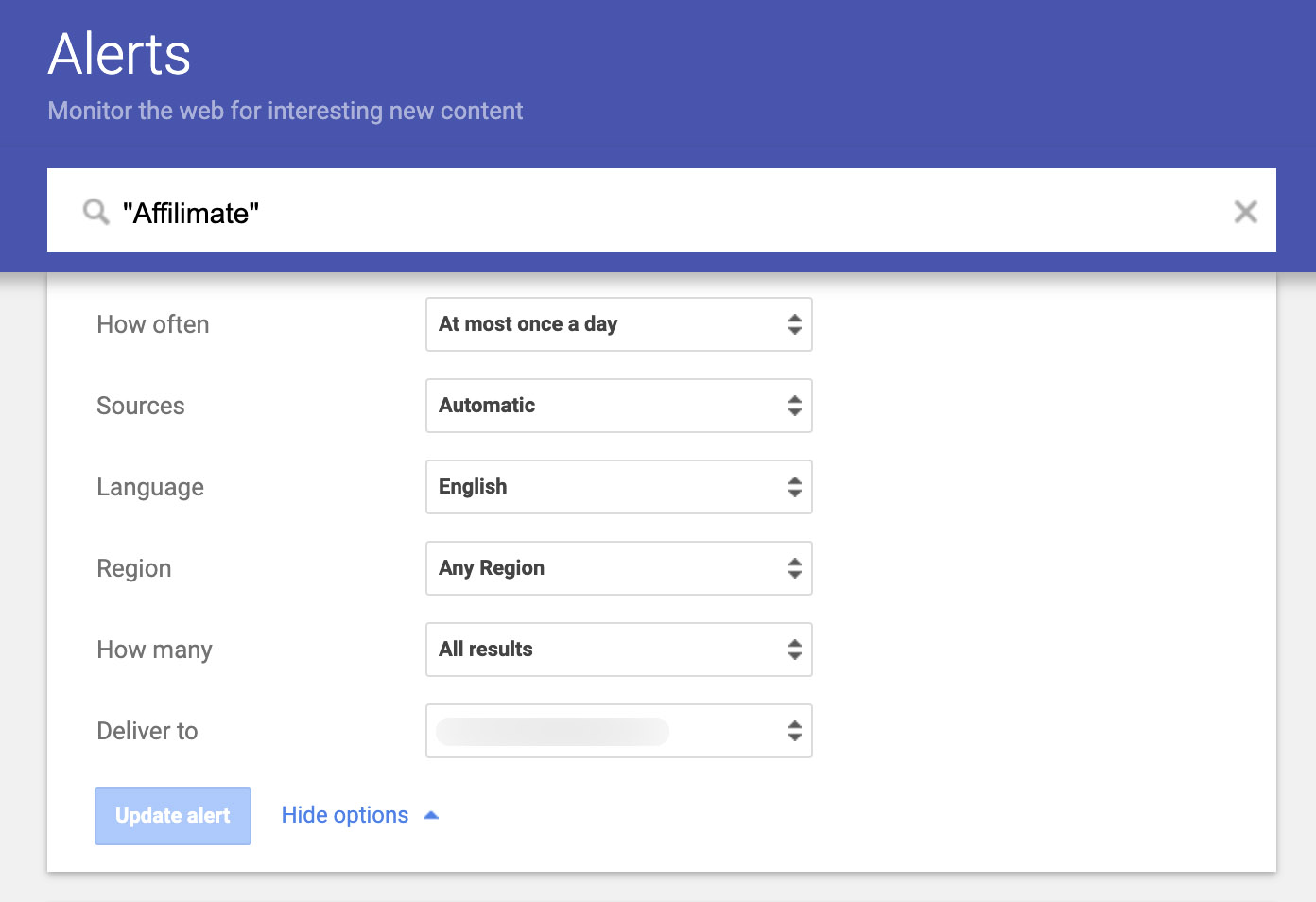
Here I've set the name for my SaaS app, but you can use your personal name or whatever you go by online.
Offer testimonials for products that you love
Do you love a product or service? Why not reach out to the creator and let them know you'd love to give them a testimonial?
Similar to integrations, testimonials often appear on the home page and can result in a link back to your website.
Here's an example of a testimonial I recently gave for swyx's book on Product Hunt (without the expectation of it appearing on a website, though I'm honored to be there!):
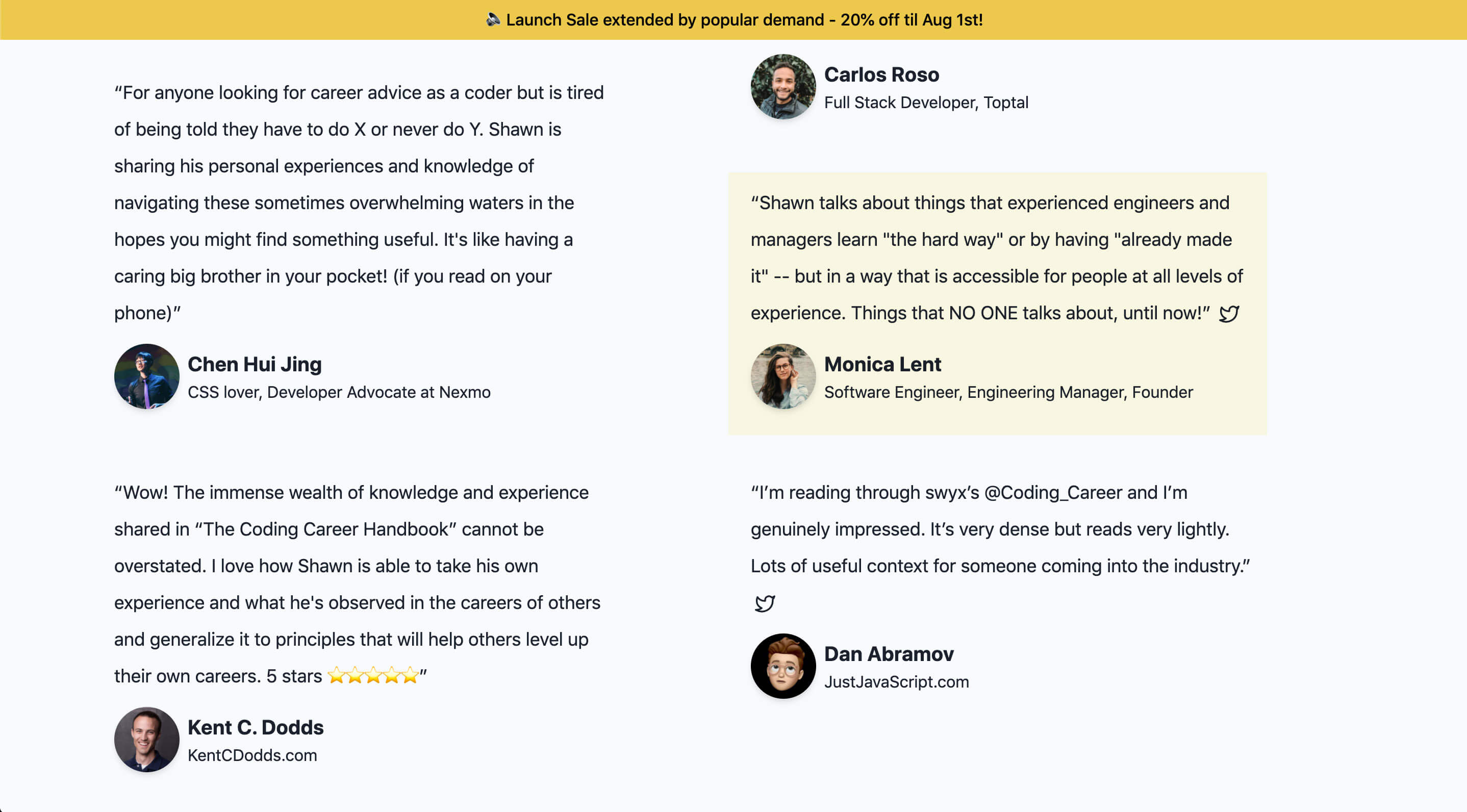
This particular testimonial doesn't result in a link to my website, just to Twitter, but in many cases they will (this is easy to check in advance if you want to try this).
For example, here are some testimonials on the website for an ebook that do include backlinks:
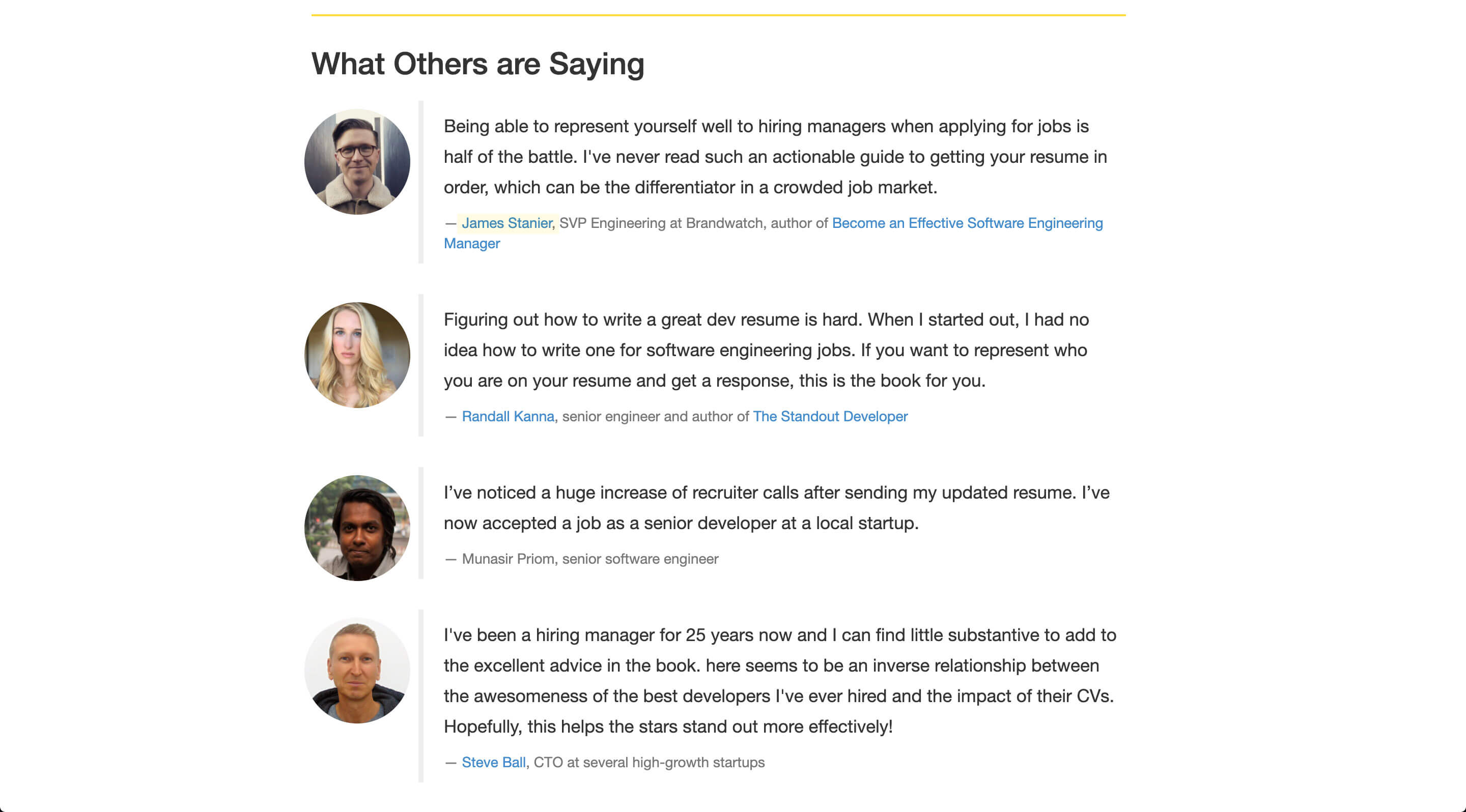
And another one from Hashnode's homepage back to freeCodeCamp:

It's a win-win for you and the creator or founder. They get great social proof for their website, you get a backlink.
You don't have to be super famous for your testimonial to be meaningful. Just genuine :)
Participate in expert roundups
An expert roundup is an article where the author wants to compile the opinions of subject matter experts. These can be great articles to be included in, because if you're an expert on something, there's a good chance the website linking you is highly relevant.
For example, I participated in this expert roundup on a website that helps SaaS companies with SEO:
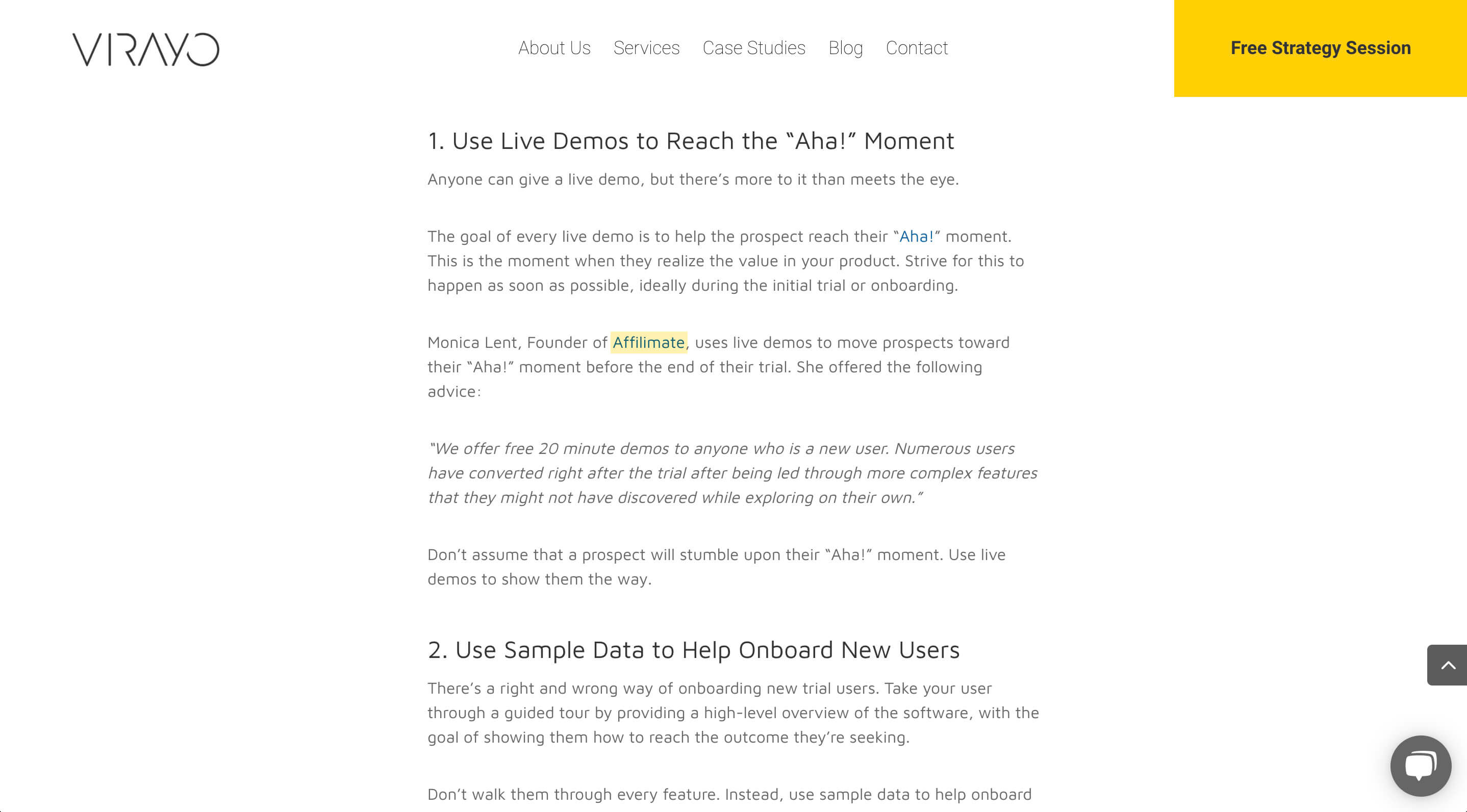
Since my own SaaS company is highly connected to affiliate marketing and SEO, it's quite a relevant link. I was also lucky enough to be among the first external links on the page inside the body copy.
The downside to expert roundups is they can be very long and include MANY external links, which dilute the power of your link. Typically, this is how it looks when you're part of an expert roundup:
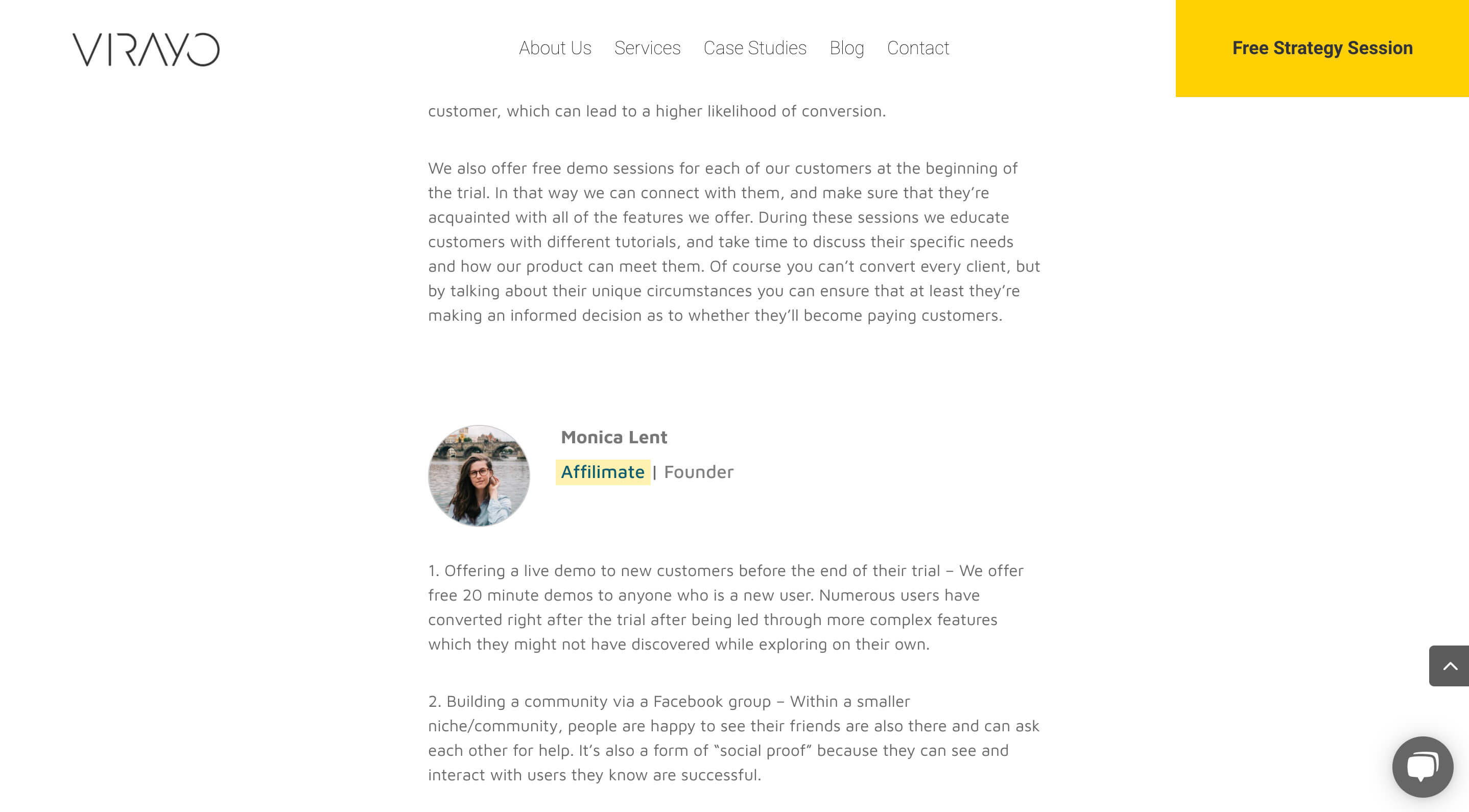
The page is very long, and your response is included next to your photo and a link to your website. This particular roundup included contributions from 24 experts.
How can you find these kinds of opportunities? In my experience, there are two main channels:
- HARO — Lots of people do expert roundups for HARO and will publish your opinion alongside many others. As you'll learn later, this can be competitive depending on your industry.
- Facebook groups — Unfortunately, I cannot share specific groups because many I'm in have already become very spammy and I don't want to make the situation worse.
I would suggest searching for groups that include words like "swap", "support", "boost", "link", "exchange", "growth", "mastermind", along with whatever you're doing (such as SaaS, B2B, B2C, DTC, consumer, blogging, fashion, travel, etc.)
Even better, you should team up with other people in areas adjacent to yours and share link opportunities with each other. Having multiple websites at your disposal can be a game-changer if you are starting out with link building.
Follow what's already working for your competitors
I realize that in tech, and as developers, we don't tend to think about other developers as competition. But Google is different.
Any website that is ranking for a keyword you want to rank for can be your competitor. Because there can only be ONE website that ranks first in Google.
If you're building a SaaS product, info product, or a service or agency, then you probably know who your competitors are or at least which websites attract a similar audience to your target audience.
One of the most common tactics for building links is just checking where your competitors are getting links from and replicating them for your website.
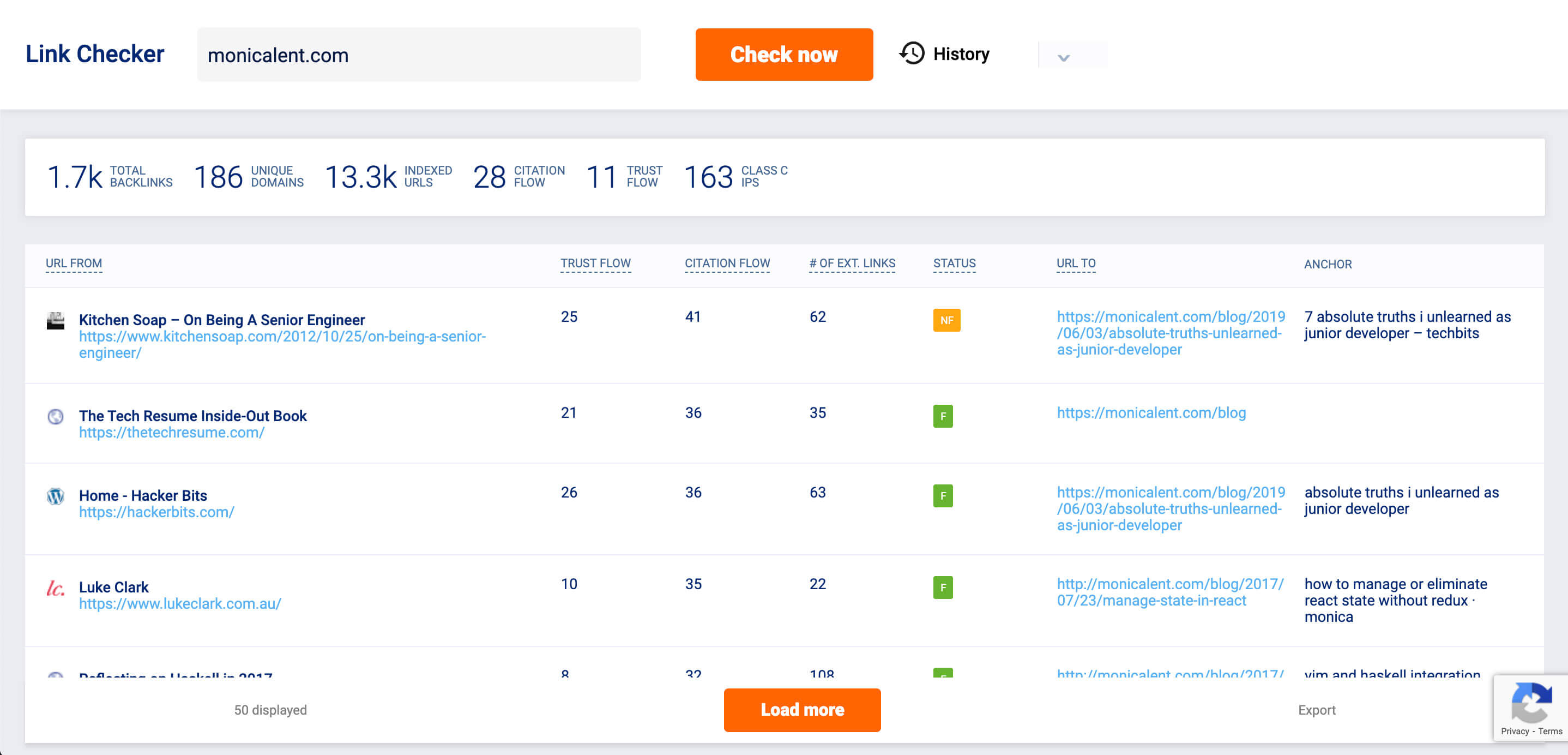
If you were trying to compete with me, you might look at these websites who link to me and see if they'd like to link to you instead.
Again, you can do this in a tool like Ahrefs. There are also free backlink checkers that will get you started with this for your first pass.
However, the best results won't come from a curated list of someone's favorite articles.
(Not because my articles are better than yours, but because a lot of it is simply up to personal taste.)
It's much easier when you target listicles of tools or resource pages where your competitor is mentioned and you are not.
You might also find integration partners that provide links, like I mentioned before, or rankings like "top developer blogs", "javascript blogs", "javascript writers", or "best bookmark managers" (or whatever your product does). Those are prime locations for you to get your link.
Just make sure your link is truly relevant (unlike the PHP hiring guide) or you might be annoying the person instead of introducing them to your truly amazing tool.
Here's an example of a backlink that is coming my way (partially) thanks to this strategy:
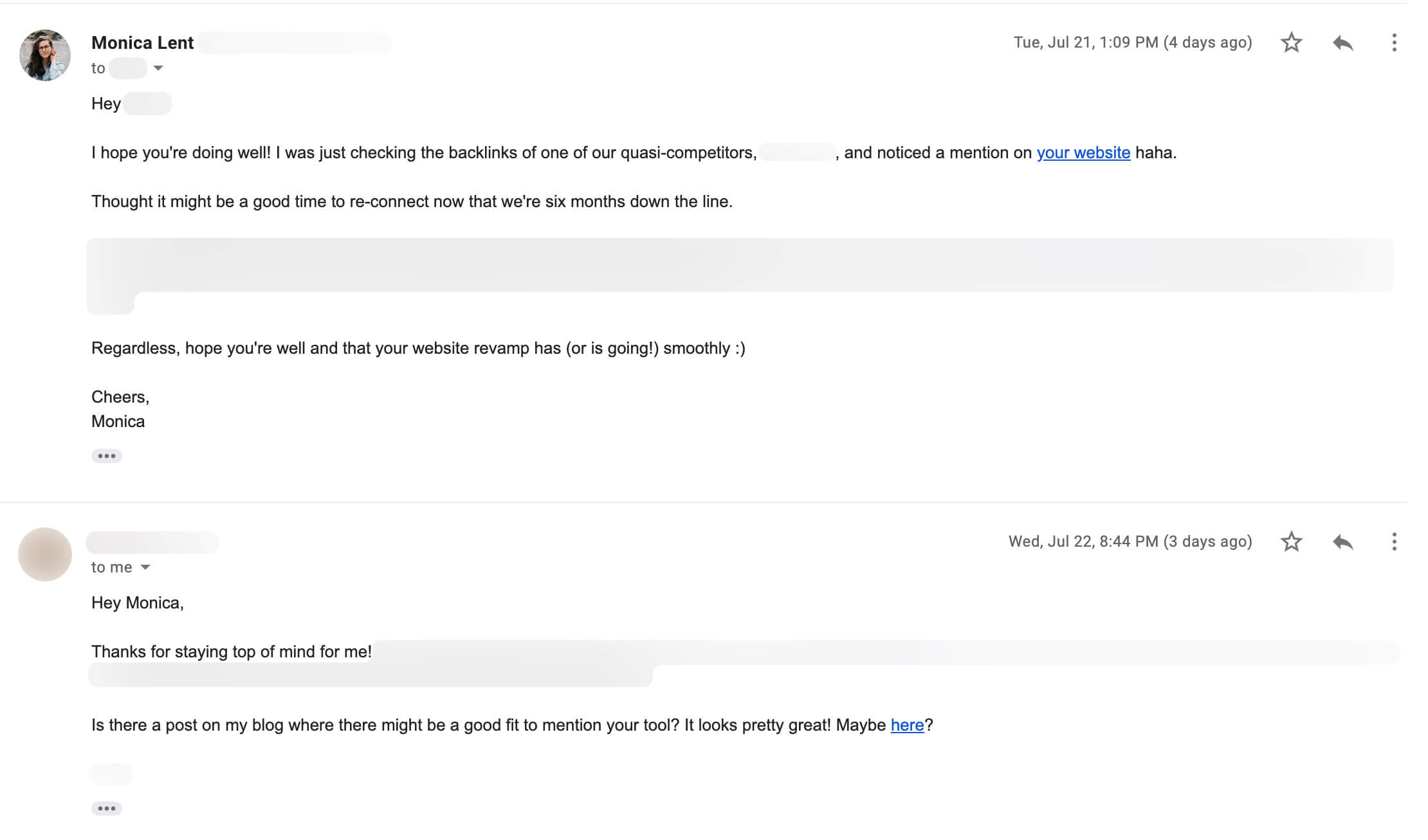
I want to take a tiny pause to make a special point about this backlink.
This isn't a cold email, asking for a backlink out of the blue. It's not even asking for a backlink at all.
The backlink to our competitor is just a conversation-starter.
This is actually one outcome of about 6 months following up and 10+ email exchanges.
The result of this persistence (and this person just being really nice), we'll get a link from a quality blog post receiving traffic from Google on an ultra-relevant, high DR website. Probably our most relevant backlink yet!
If necessity is the mother of invention, then persistence is the mother of backlinks. — Me
Takeaway: The best links often require the most effort. FOLLOW UP.
If you feel bad about following up, I recommend listening to this podcast episode with Steli Efti about sales tips every founder should know. He'll convince you if I can't.
Again, it's not spam if you're offering real value and being helpful, especially if the person has already responded to you before and expressed interest in connecting.
How to get links from the world's leading publications as a relative nobody
If you've ever wondered how some bloggers get featured on huge websites like Forbes, the BBC, The Guardian, and Business Insider — there's a good chance they did it through HARO.
HARO stands for Help A Reporter Out, and is a place where journalists and news sources (that would be you) can connect. It's a 3x per day newsletter that contains topics journalists need sources for, and you reply to those topics with a pitch.
Here's what it looks like:
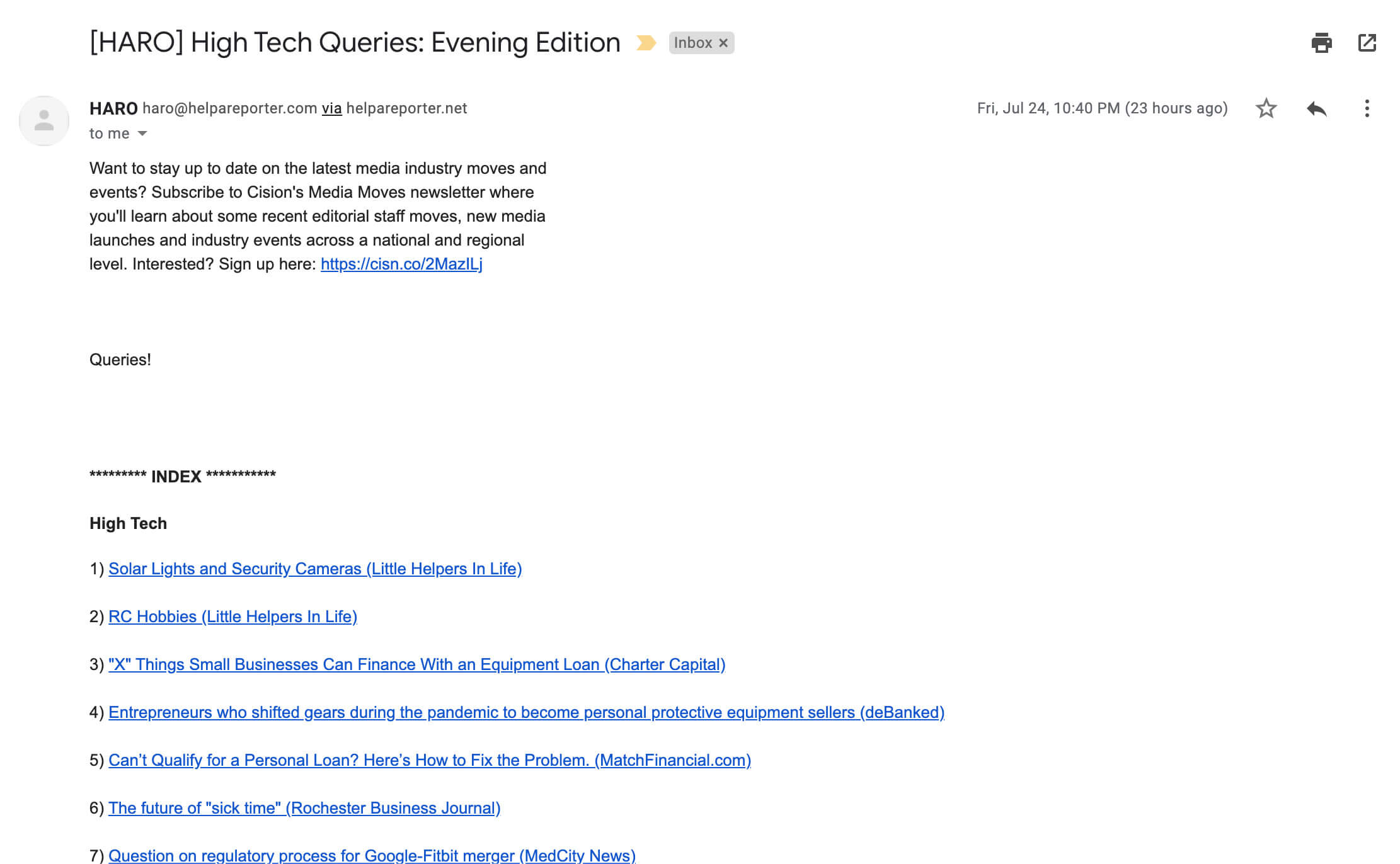
There are different categories like "High Tech", "Business and Finance", "Travel", and others. You can choose which ones to subscribe to and you'll see requests like this:
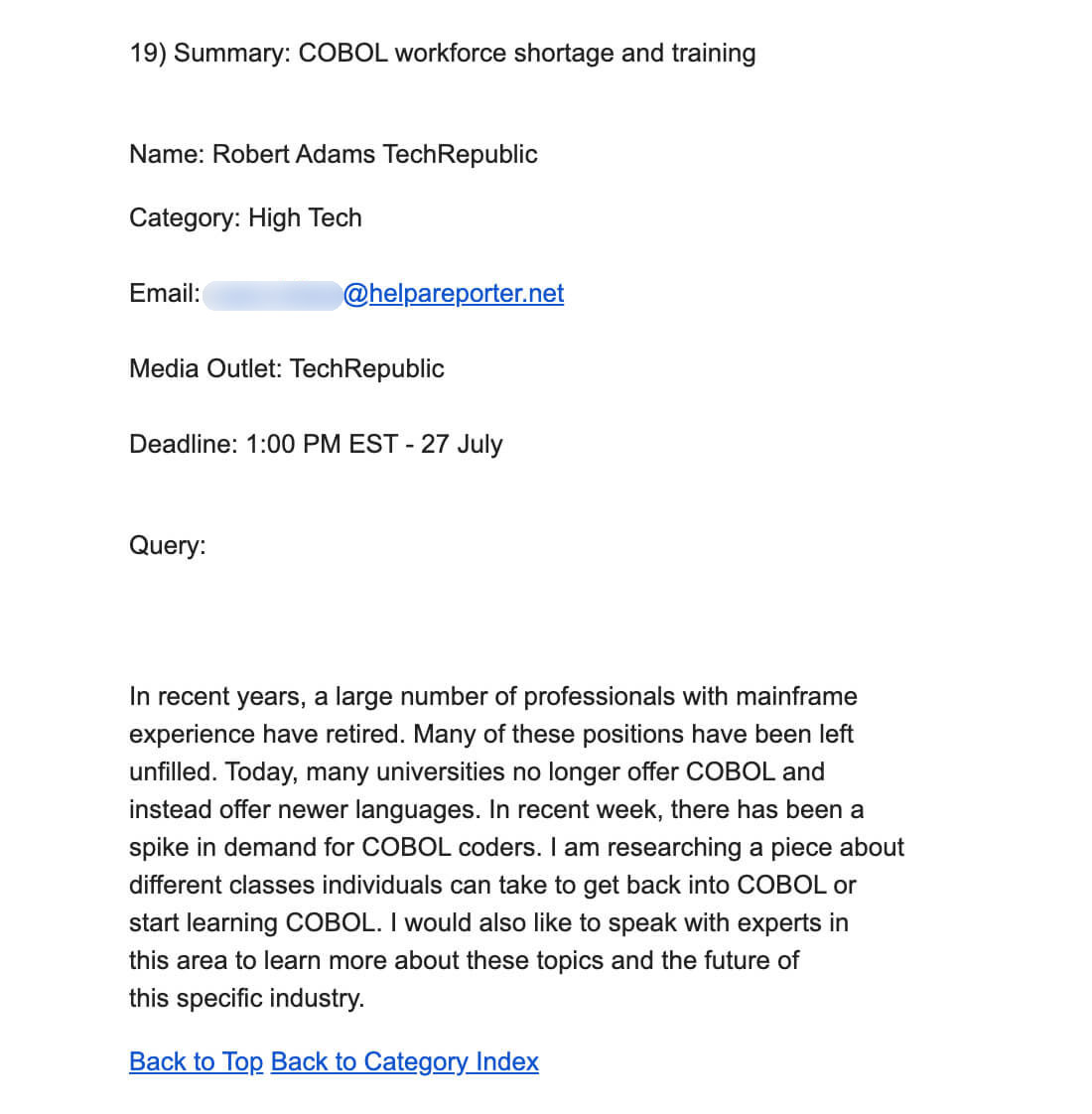
As a developer, I recommend subscribing to "High Tech" and "Business and Finance" (there's often an overlap). If you're building some kind of tech product connected to another sector, then subscribe there too.
A lot of requests clearly state they are intended for C-level execs, but plenty of them are just looking for people with experience, including developers.
Here's an example of a link I earned by ranting about Jira:

It may be unfortunate that it's tagged as ugc (user-generated content), but that's something worth
checking in advance before you spend time responding with a pitch.
I mostly use this technique to build links to other projects (which earn money) because it is very time-consuming. Here are some tips on getting your HARO pitch accepted if you want to try it.
My acceptance rate is probably around 20% so don't get discouraged if your first few pitches aren't accepted.
Since so few developers do this, my hunch is that highly technical topics are less competitive than topics where the industry is clued in to HARO, such as marketing.
Write a guest post for a quality online publication
Guest posting essentially means writing an article for someone else's website. Some websites will pay you to write the article, others you contribute to for free.
You can find opportunities like this by googling for your topic "write for us" or your topic "guest post". For example,
javascript "write for us" or laravel "guest post", or whatever topic is relevant for your blog or product.
Alternatively, check your favorite online publications and look for a link in the footer that might lead to something like this:
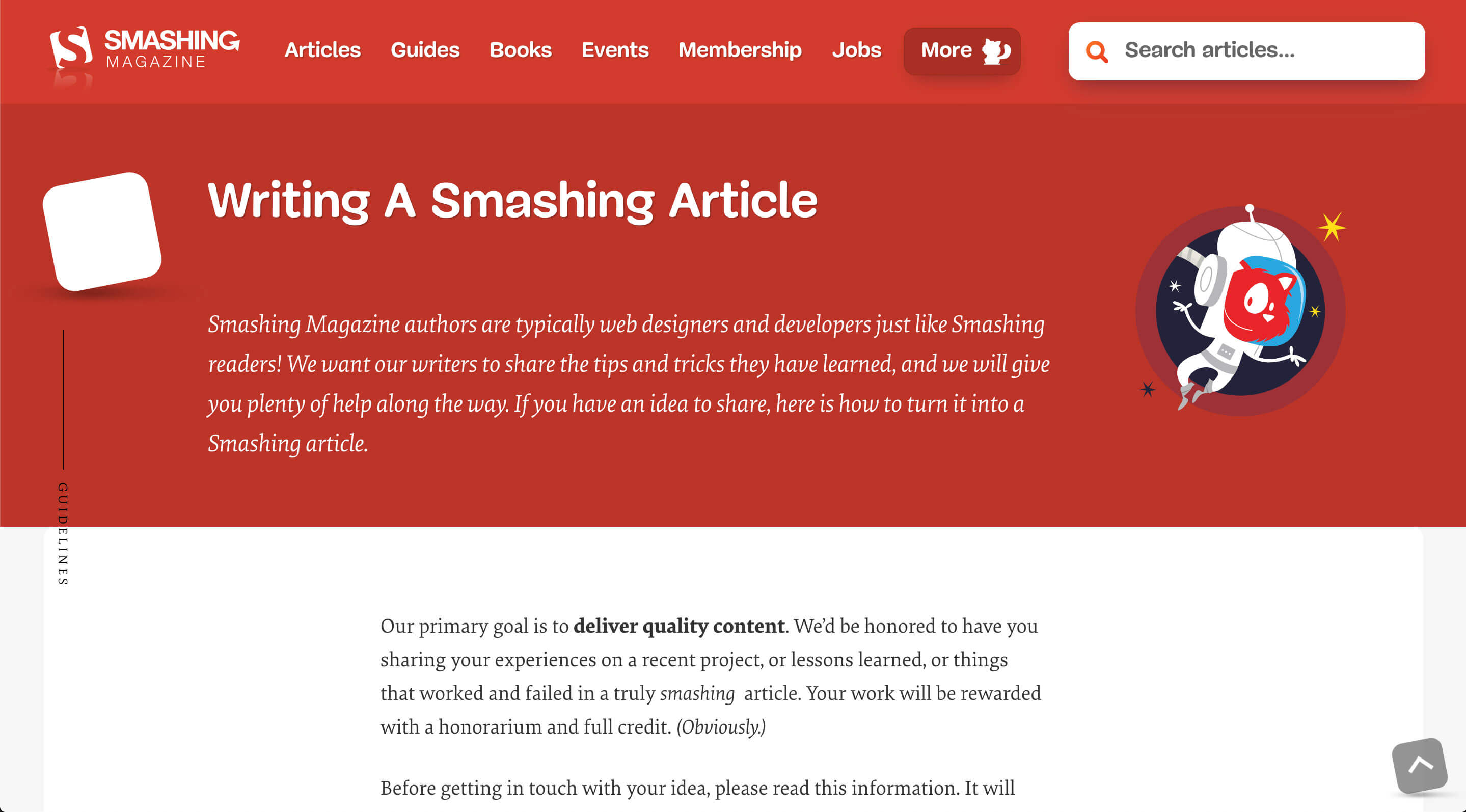
I'm going to be honest with you: I generally don't guest post, and I'm not sure it's worth it if your goal is only to build backlinks.
My reasoning is pretty simple.
The best websites to get links from are the ones who are picky about the guest posts they publish, not ones that'll take anything they get pitched (because believe me, they probably get pitched A LOT). They want amazing content.
But if I'm going to write amazing content that I believe will attract links, shares, followers and subscribers, I want to put it on my website, not someone else's.
That said, you might be surprised at which influential websites in the tech industry allow guest posts and could be beneficial for link building purposes if done correctly:
- CSS Tricks: https://css-tricks.com/guest-posting/
- Smashing Magazine: https://smashingmagazine.com/write-for-us/
- A List Apart: https://alistapart.com/about/contribute/
- Cloudways: https://cloudways.com/en/write-for-us.php
- The Next Web: https://thenextweb.com/podium/about/
- Webflow: https://webflow.com/blog-pages/write-for-us
This is just a small selection of sites you might recognize.
Here's an example of a guest blog post I think could be helpful for link building purposes.
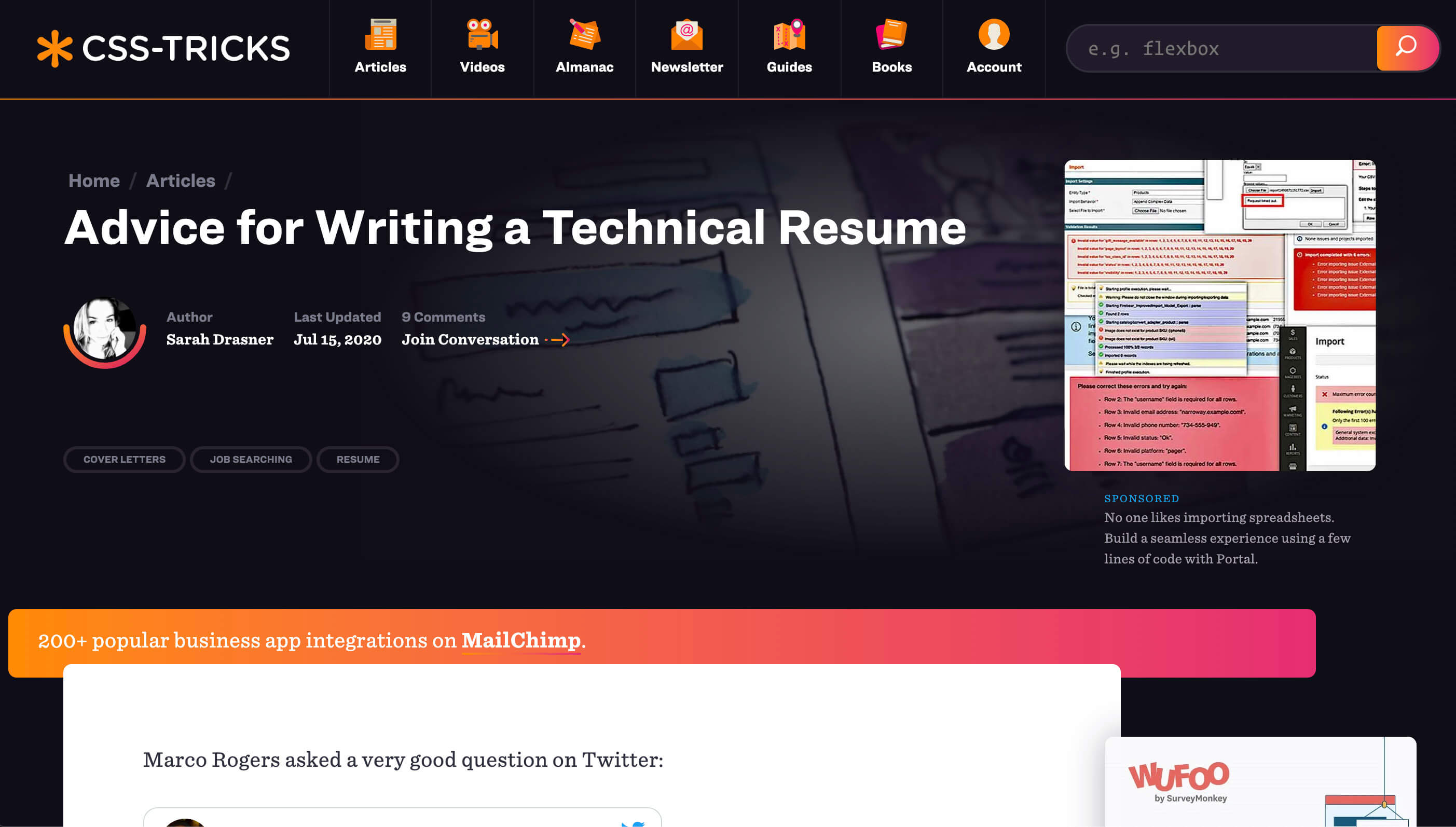
If you're familiar with Sarah's work, you'll know that she's a regular contributor to CSS Tricks. And if she wanted, it would be a great place to include a link back to something she'd written on her own domain.
What makes this a potentially valuable guest post? A couple of things.
- Relevancy — Sarah does a lot of work with CSS so it's a highly relevant place for a backlink to her personal website.
- No "guest post" hints — The page doesn't mention anything about "guest post" on it, so there's a chance that a contextual link to her site from within the article wouldn't be flagged as unnatural.
Again, there is a lot of debate over how effective guest posting still is and what "hints" can render an article helpful or irrelevant for backlinks.
Officially, Google has declared guest posting dead for many years, but most SEO practitioners agree that it can still be effective if done correctly.
Let's move on to a less controversial tactic...maybe.
Run a survey and analyze the results (link-worthy content validation on easy mode)
I don't know about you, but when I have an opinion on something, I love looking up and referencing studies that are going to prove me right.
It's probably a character flaw, if I'm honest.
That's why articles about "statistics" and "facts" tend to pick up a lot of links. People want to validate their existing opinions.
Surveys are a bit like studies and statistics in that respect. Slightly less scientific, but if the facts support what we want them to, we like the results and want to share (and link) to them.
Here's Stack Overflow's 2019 developer survey (for all its flaws...), being linked from valuable locations like Docker's website and the Golang blog (as well as 4,257 other domains).
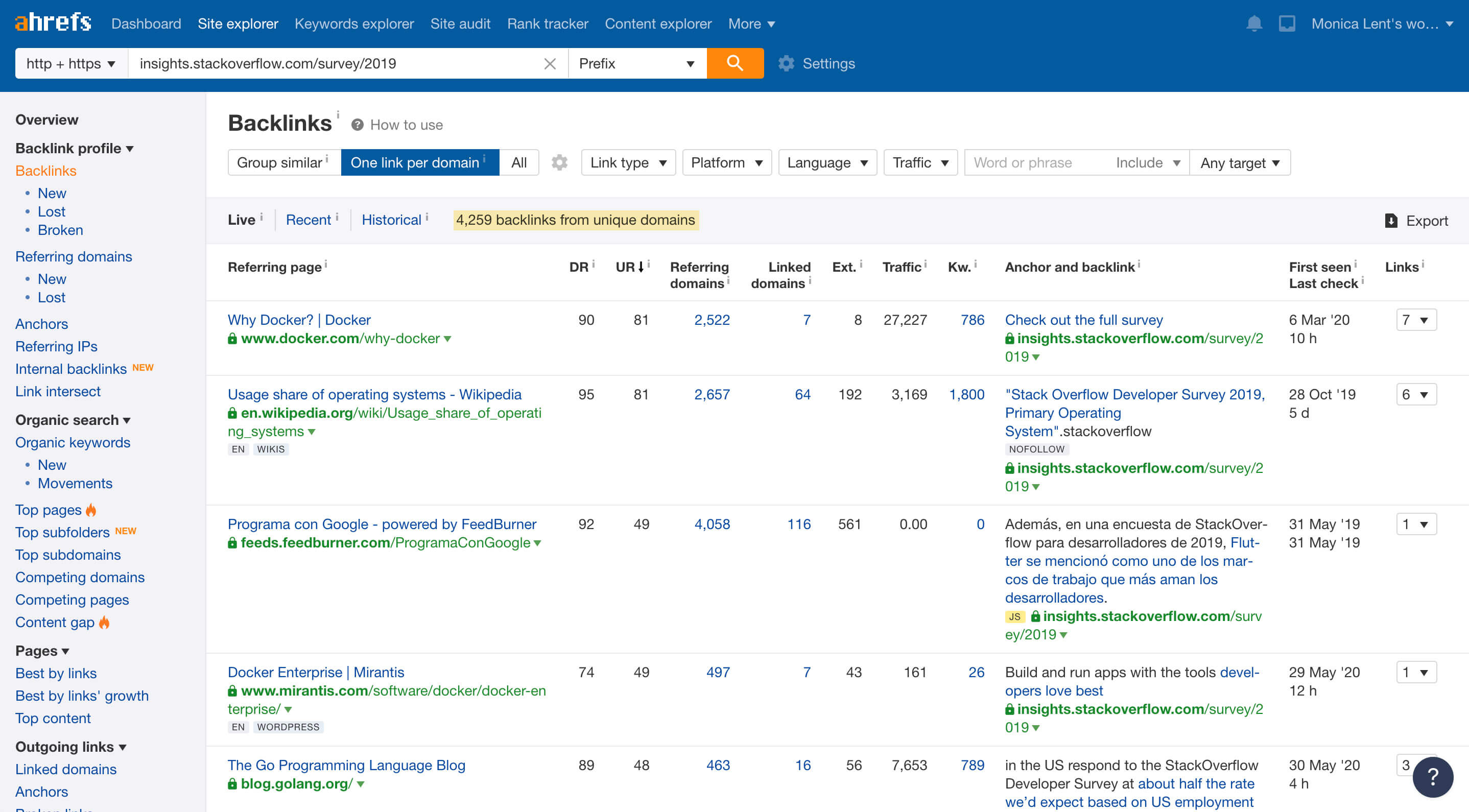
But you can test and get data for a data-based article without doing as much work as Stack Overflow.
Just run a Twitter poll and write about the results if they gain traction.
Here's one I ran to help a friend collect data for a conference talk she was giving about the ethics of open source.
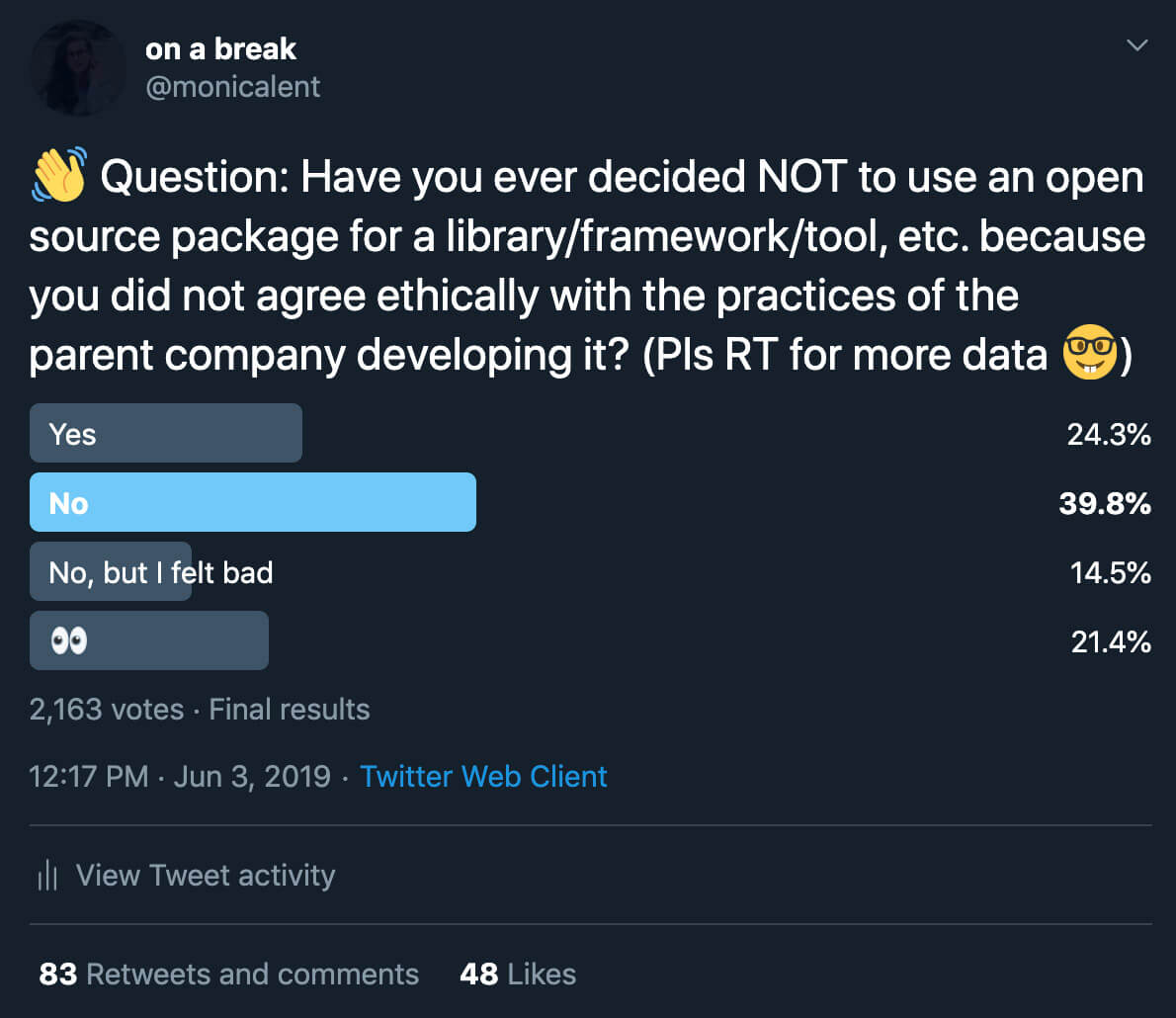
In this example, you can see that my poll received over 2,000 votes.
I'd argue this is a pretty good indication of interest in the topic, and a dedicated article about it is likely to do well.
In fact, in my "unlinked mentions", I found someone who linked my tweet and wrote a short article on exactly this topic.
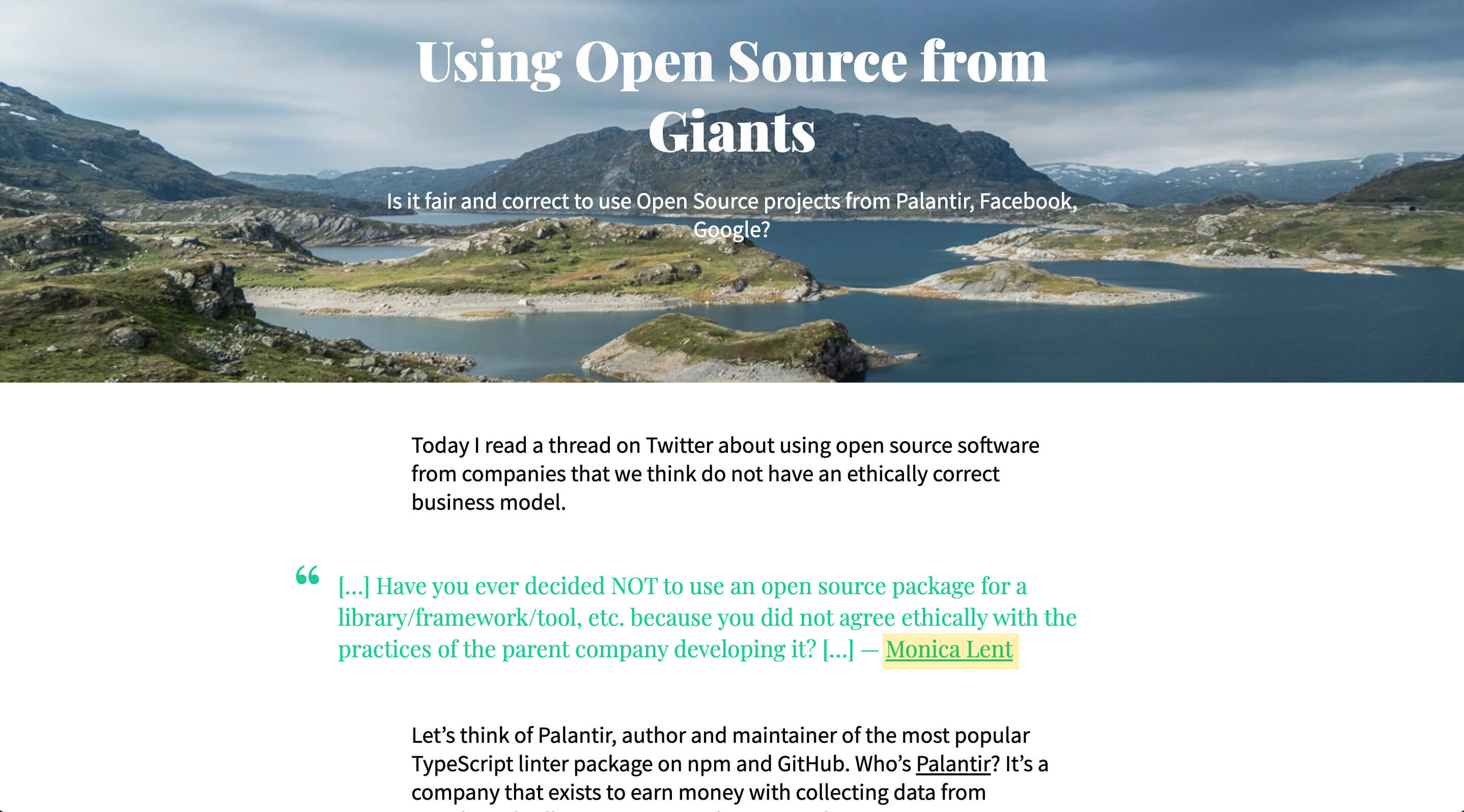
Take away: You can validate your article idea using a Twitter poll and then write content using proven methods like surveys and statistics to create something likely to attract backlinks and social shares.
Just be honest about the sample size and use it as a starting point as opposed to the entire foundation of your argument.
Submit your project to a relevant, curated directory
I put this low on the list because it's usually not going to result in a powerful link, but the combination of the link and referral traffic could be worth it for you.
In short, a directory is a website that lists other websites in a discoverable way, usually around a single topic. They tend to look something like this:
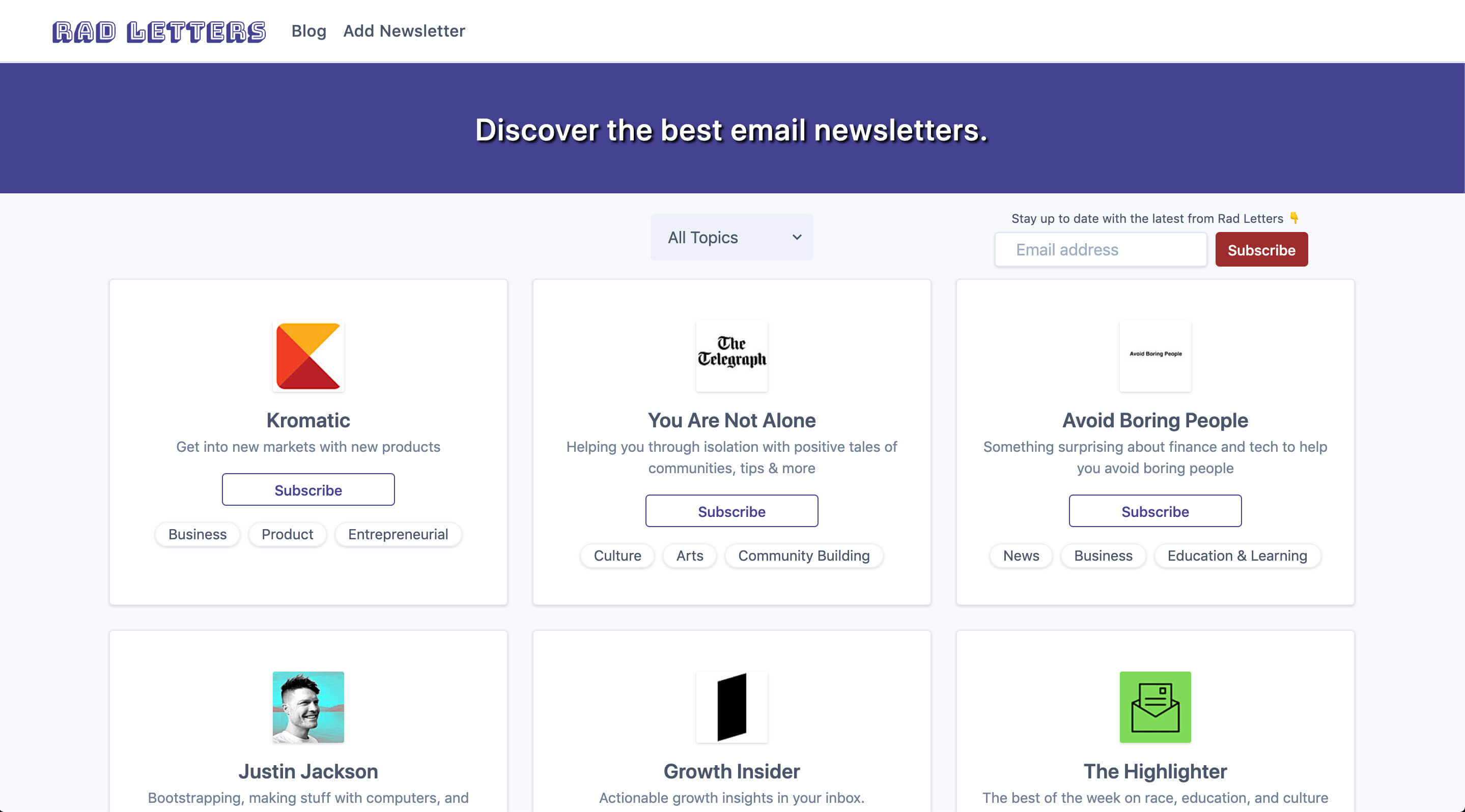
This site is about newsletters, but there are directories for projects made with ReactJS, VueJS, Tailwind CSS, Laravel, pretty much anything you can think of.
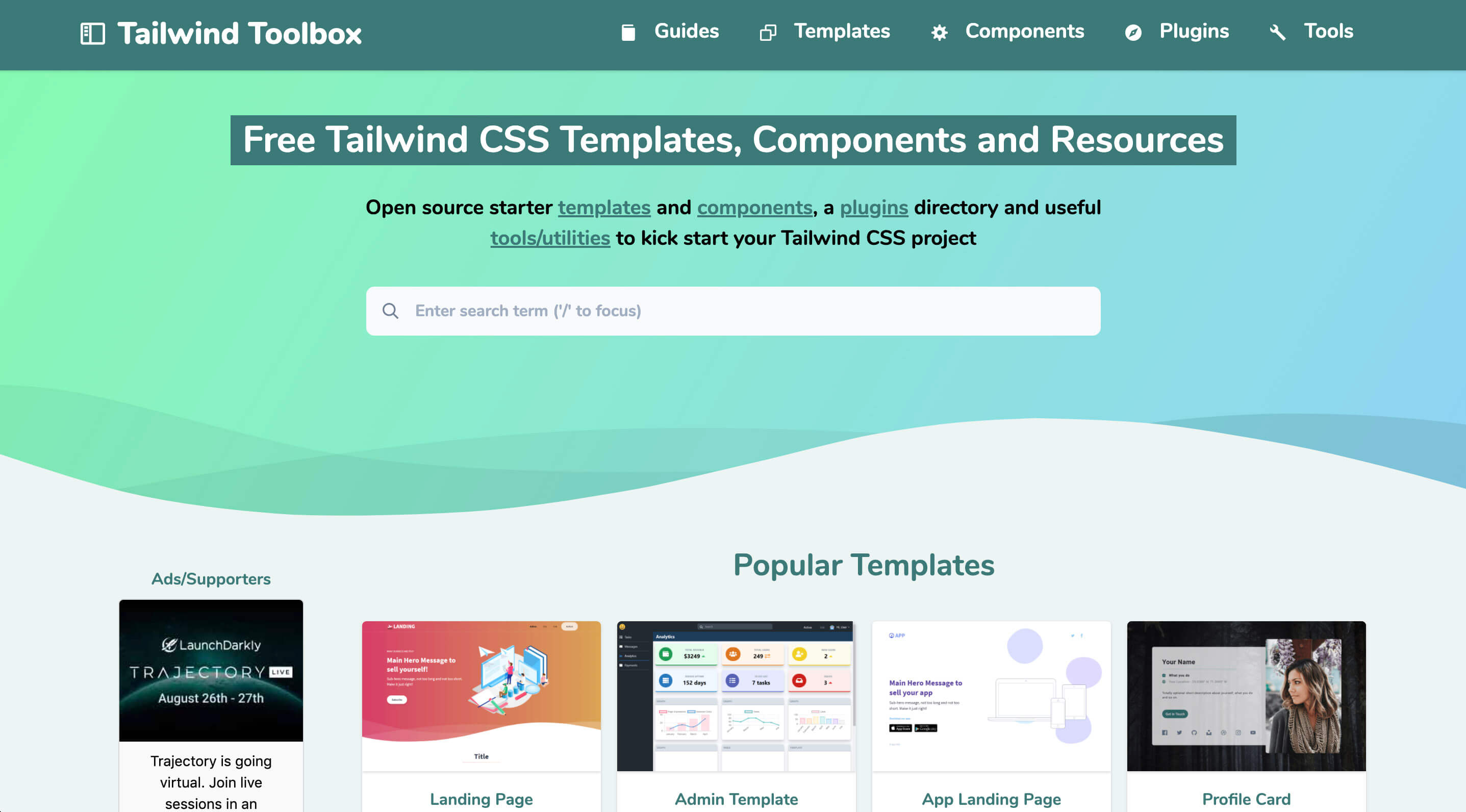
Admittedly, most directory websites don't tend to have strong backlink profiles themselves. That means they probably won't help you much with ranking.
However, it's easy to submit a project to a directory and if the directory is popular, you could even get some referral traffic. Personally, I do pick up subscribers from time to time from these directories.
Plus, these are some of the easiest links to get so why not?

Here are a handful of curated directories and sites to check out:
- For tech projects — Tailwind Toolbox and Alpine Toolbox
- For articles — Changelog and Programming Digest
- For newsletters — Rad Letters and Thanks for Subscribing
The most relevant websites will depend on the website or project you're building links to. Chances are, you know the websites in your tech stack or niche that function as directories better than I do.
Just double-check for things like 302 redirects, nofollow links, and client-side rendered popups
if you want any benefit from submission at all.
Thanks to David for help with this list!
Bonus tip: Get listed on local websites for tech startups
These are also directories, but they tend to be more authoritative than the kind that developers create to showcase projects in their favorite tech stack.
For example, Berlin has an official startup map where you can submit your business.
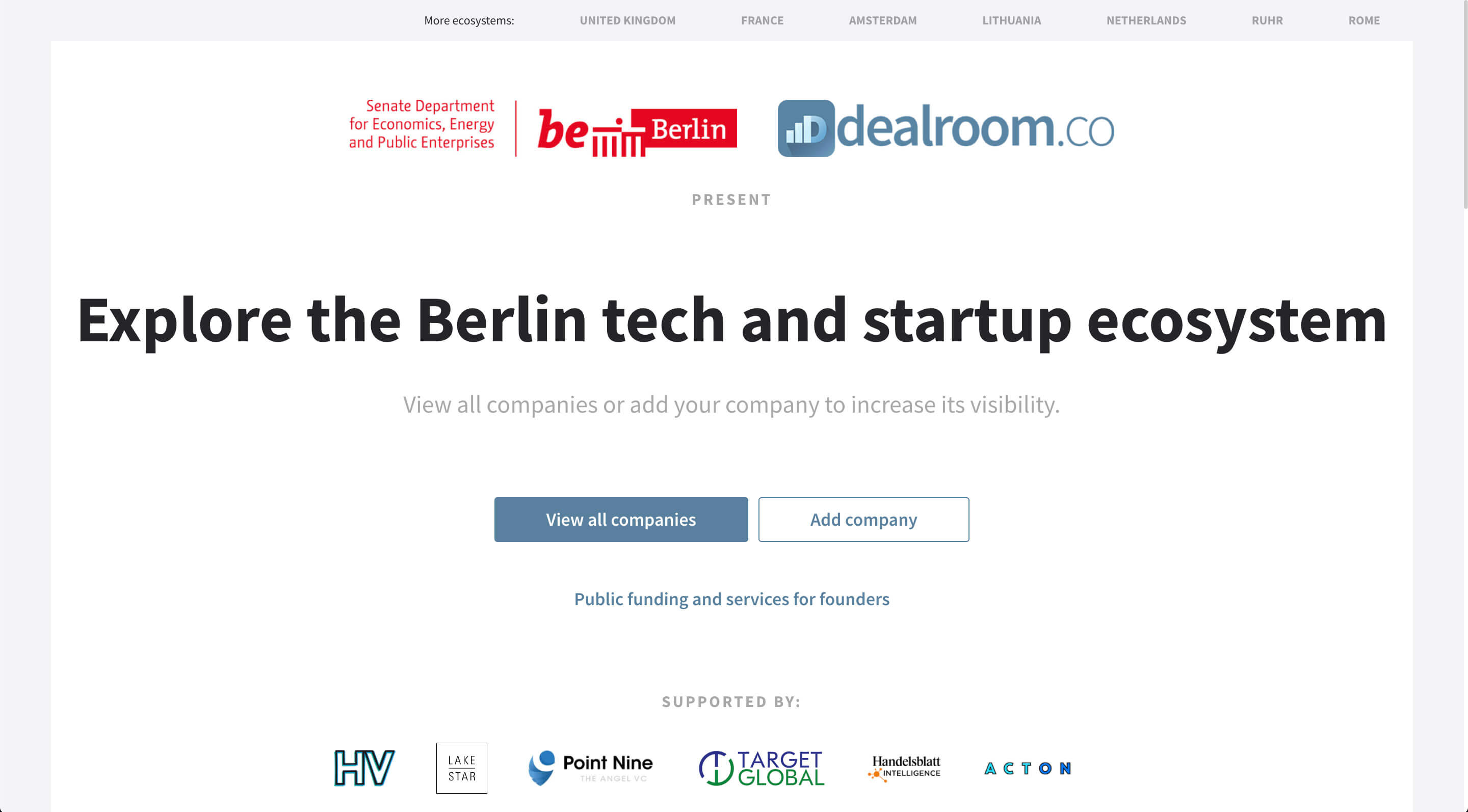
While this site only has a DR of 29, being in local listing is a great way to connect with other founders in the tech scene near you. Most cities have multiple, similar websites where you can either submit your company directly or apply to be listed.
You don't need to have VC-funding to be listed on these websites.
Undercut your competitors with a free tool or app
You might remember that earlier I linked to a free tool that allows you to check the backlinks on your website.
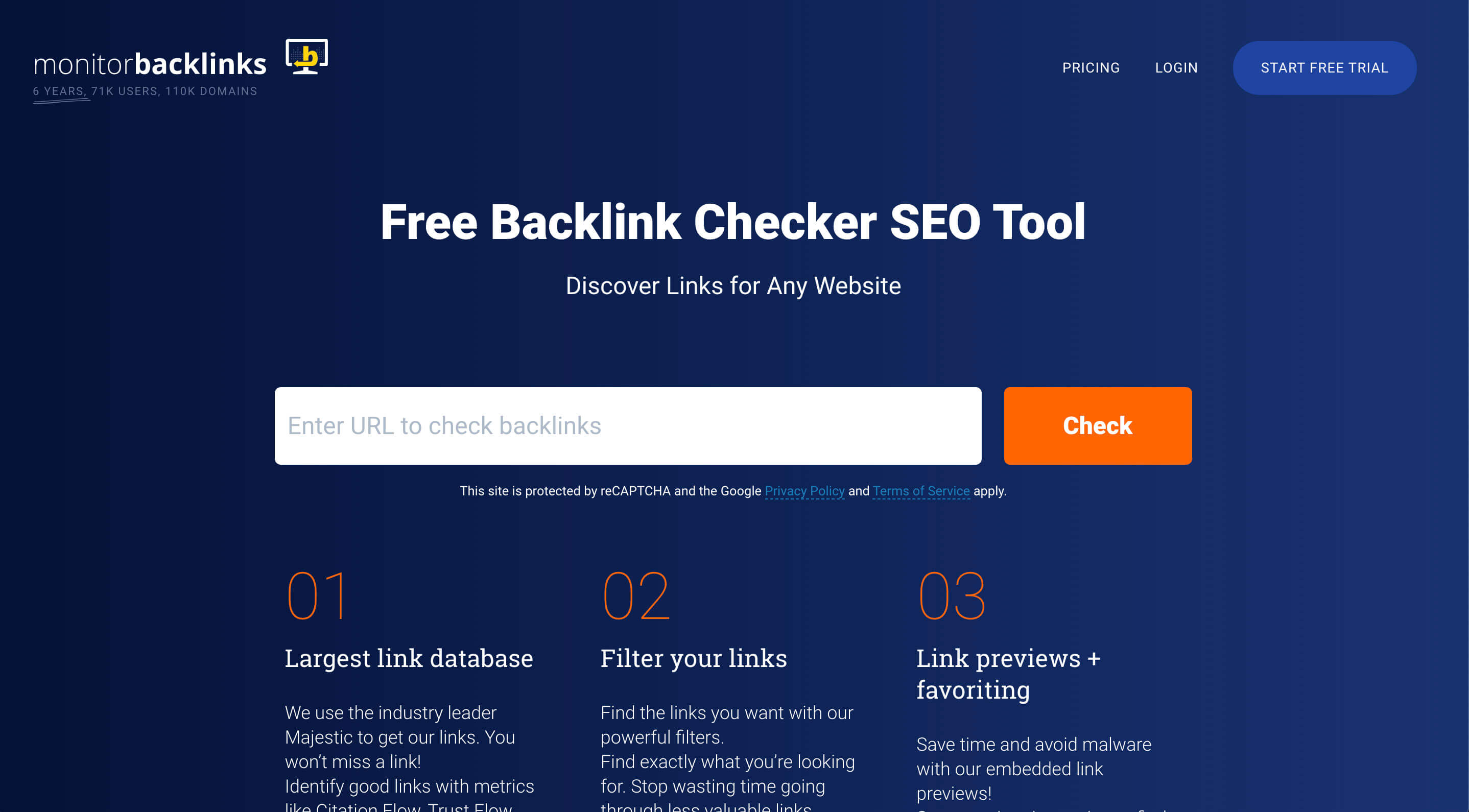
The reason I linked it is simple: I pay for a few SEO-specific tools, but I know most of my readers won't be using them. So I include a mention for a free alternative (I know Ahrefs also has a free version but I decided to share the love ;)).
You can see this is working pretty well for Monitor Backlinks (and everyone else):
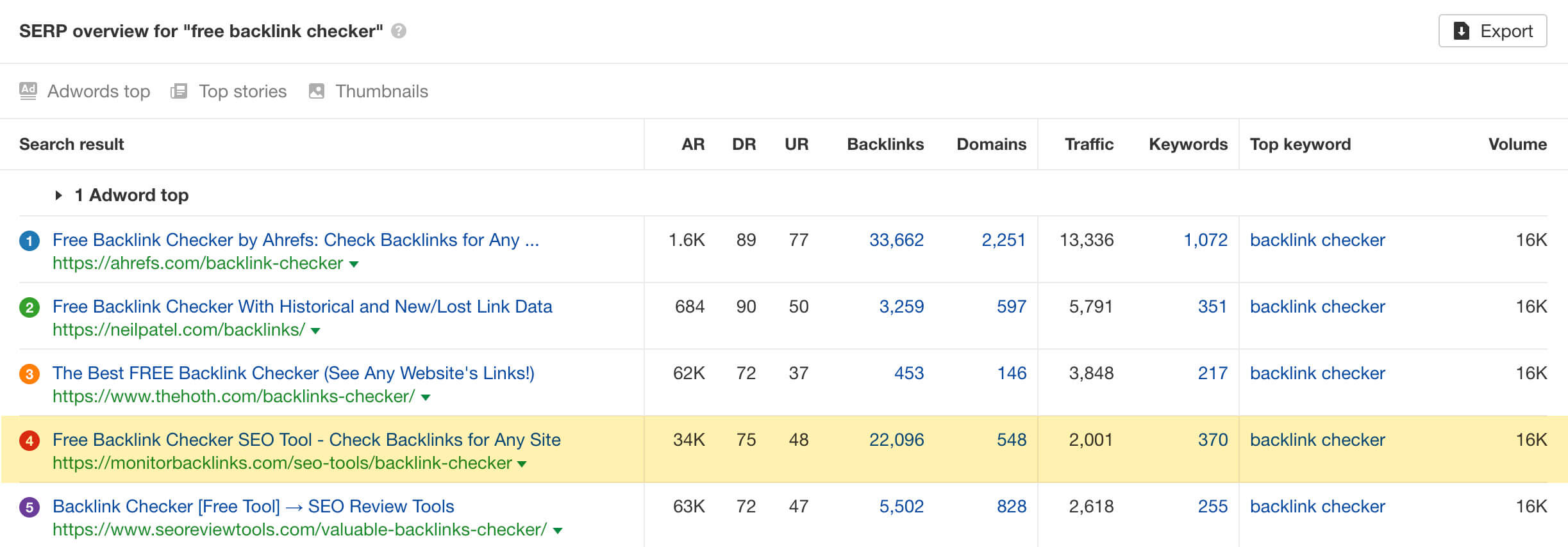
You can use this same strategy to build links to your indie product.
Create a lightweight tool or app that's a free alternative to something your competitors are charging customers to use.
You know what's easy and what's hard to build (or at least, that's what we think before starting anything). There's a good chance you can create an MVP on the weekend and people will be happy to use (and link to) something useful for free.
As a bonus, this is a great way to collect leads for your main product as well.
If you don't have a product and you just want to build links and bring attention to your developer blog, you can still use this technique.
Create a useful standalone tool and host it on the website you want to build links to. Addy Osmani is really good at promoting tools like this:
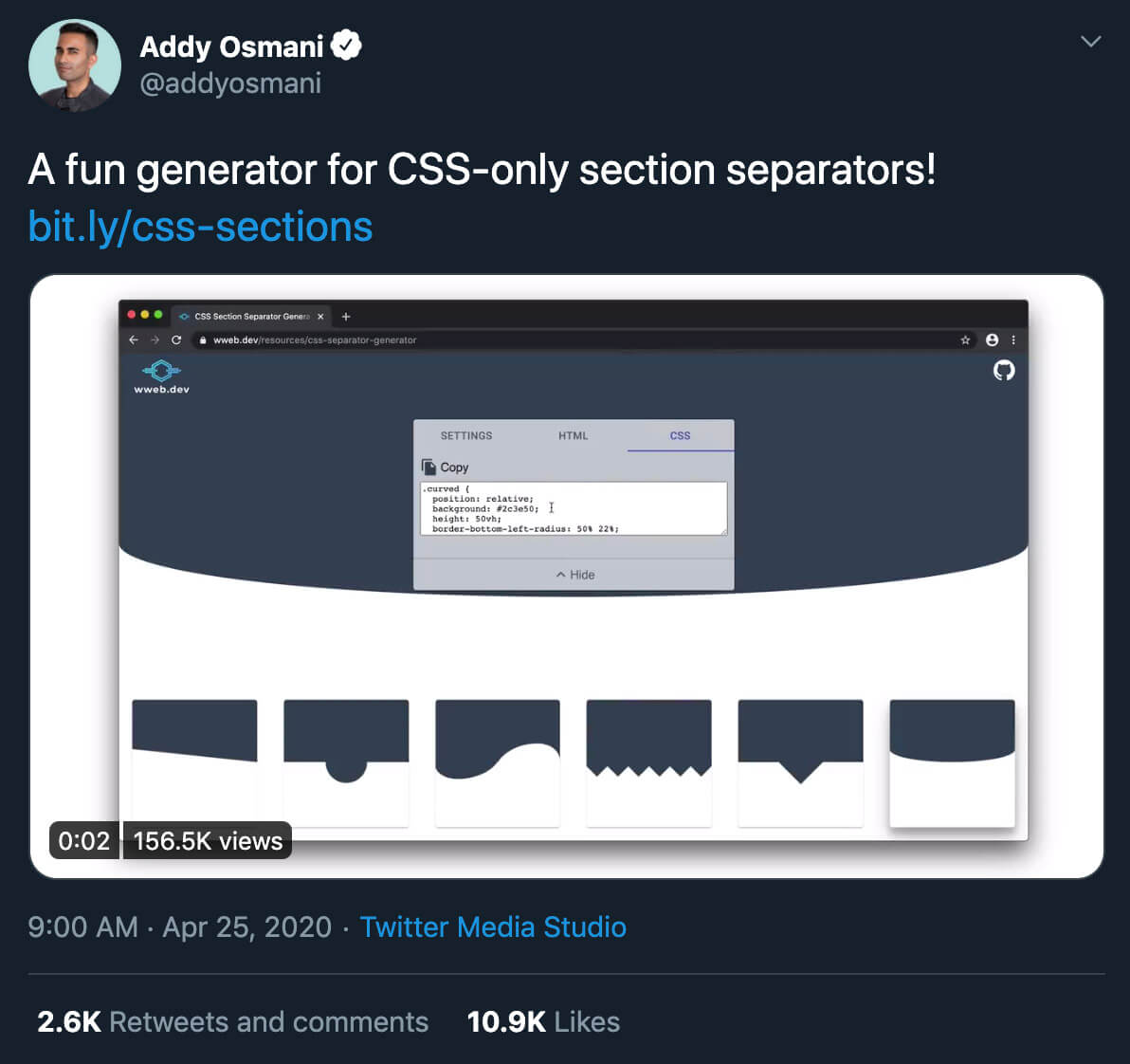
I can't ignore the fact that Addy already has almost a quarter-million Twitter followers. These slick GIF-laden tweets that link to dev utility websites surely contribute at least a little to that number.
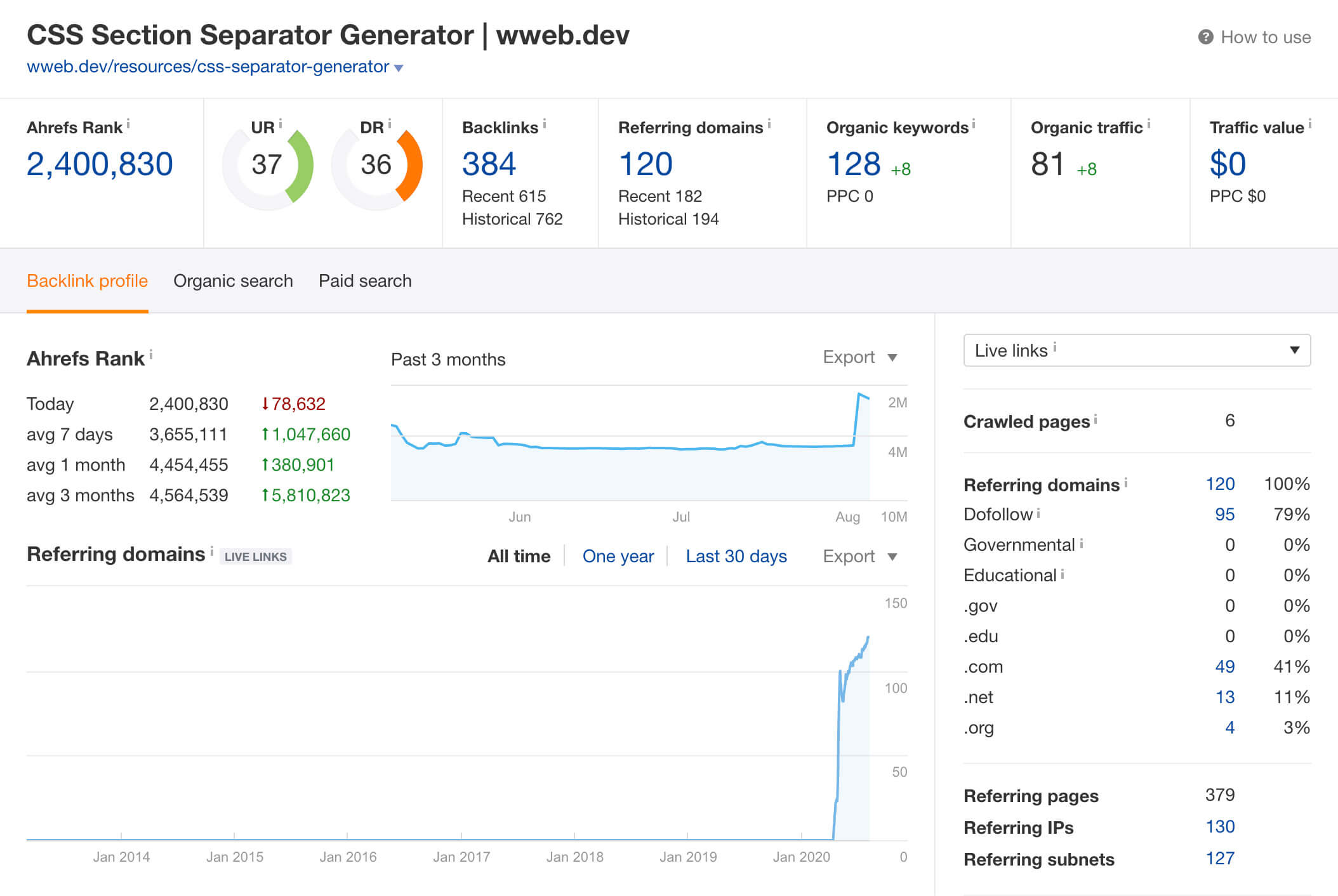
And you can see, this standalone dev tool picked up links from over 100 domains in an ultra-short timeframe.
The website isn't even run by Addy, the author just benefited from having a well-packaged tweet delivered to a relevant audience en mass.
You can also see that this website has a lot of content focused on these standalone resources.
It's growing links and keywords pretty quickly for a website run by a single person, launched this year, and with only 21 articles.

Making mini tools that help developers write less of their own CSS (or code in general) seems to be a winning strategy you could try for your own developer blog.
Rank something people are proud to mention (and then become a reference for the topic)
In particular if it's companies or startups you decide to rank, you have a chance to land on their Press page.
For example, Seedtable has ranked the 115 Berlin startups to watch. There are lists for dozens of other cities in Europe as well.
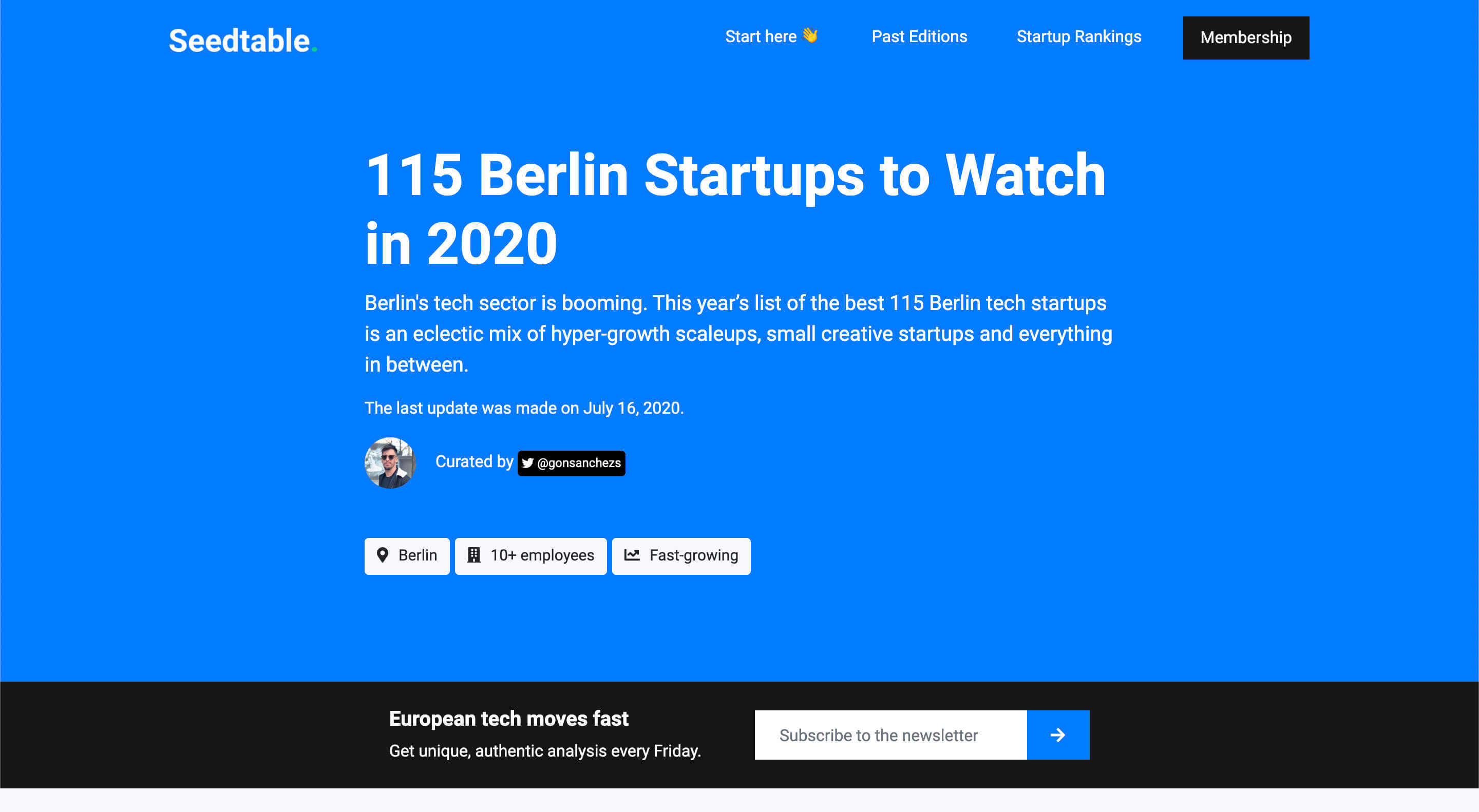
And, startups are more than happy to link to the rankings on their website.
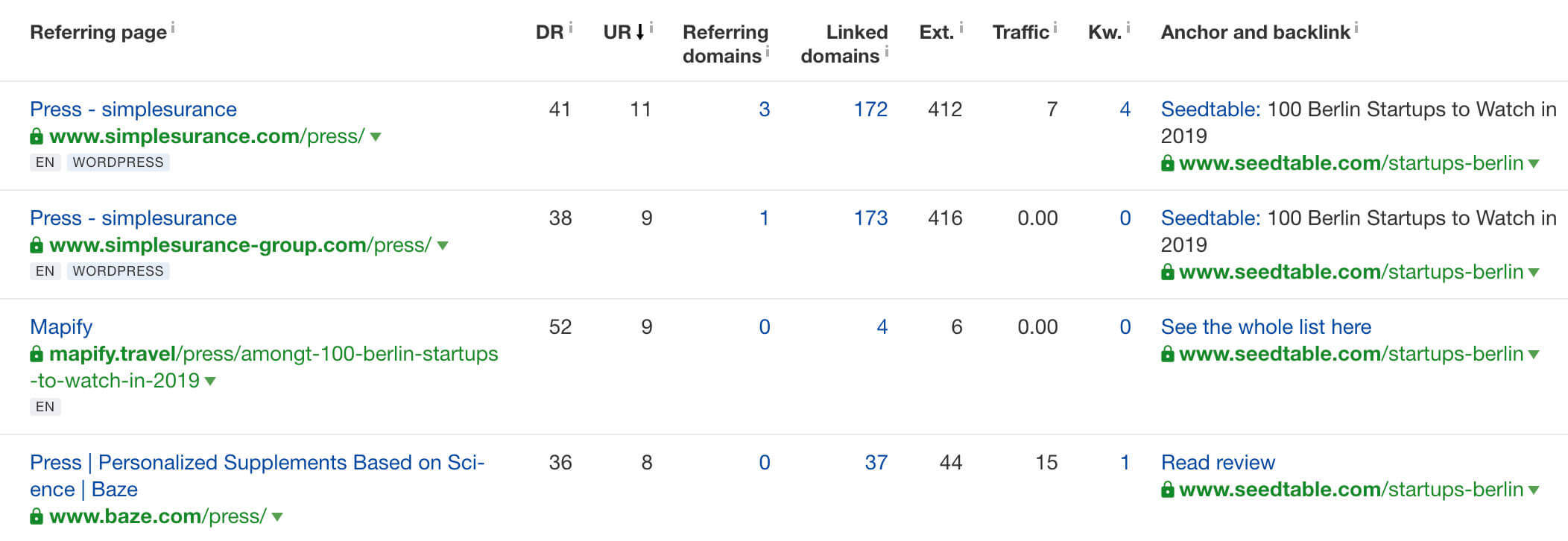
But the bigger benefit is when your rankings become a go-to reference on the top of what's "best", "top", "most profitable", and so forth.
Here's a nice .gov link from the city of Austin, Texas, citing Seedtable in their effort
to make Austin an attractive place for startups to do business.

I'd argue the key to success is making the rankings look "official" instead of someone's opinion in a blog post (especially if no one cares about your opinion just yet ;)).
That's what makes it legit enough to land on a press page or become a reference for stats and figures in an article.
Here are a few ideas relevant for developers, indie hackers, and technical founders:
- Best no-code tools: Website builders, Form tools, Automation tools
- Top bootstrapped startups: B2B, B2C, SaaS, Productized Service
- Top remote-friendly startups, sorted by benefits and searchable by tech stack
Here at Blogging for Devs, we've ranked the best developer blogs:
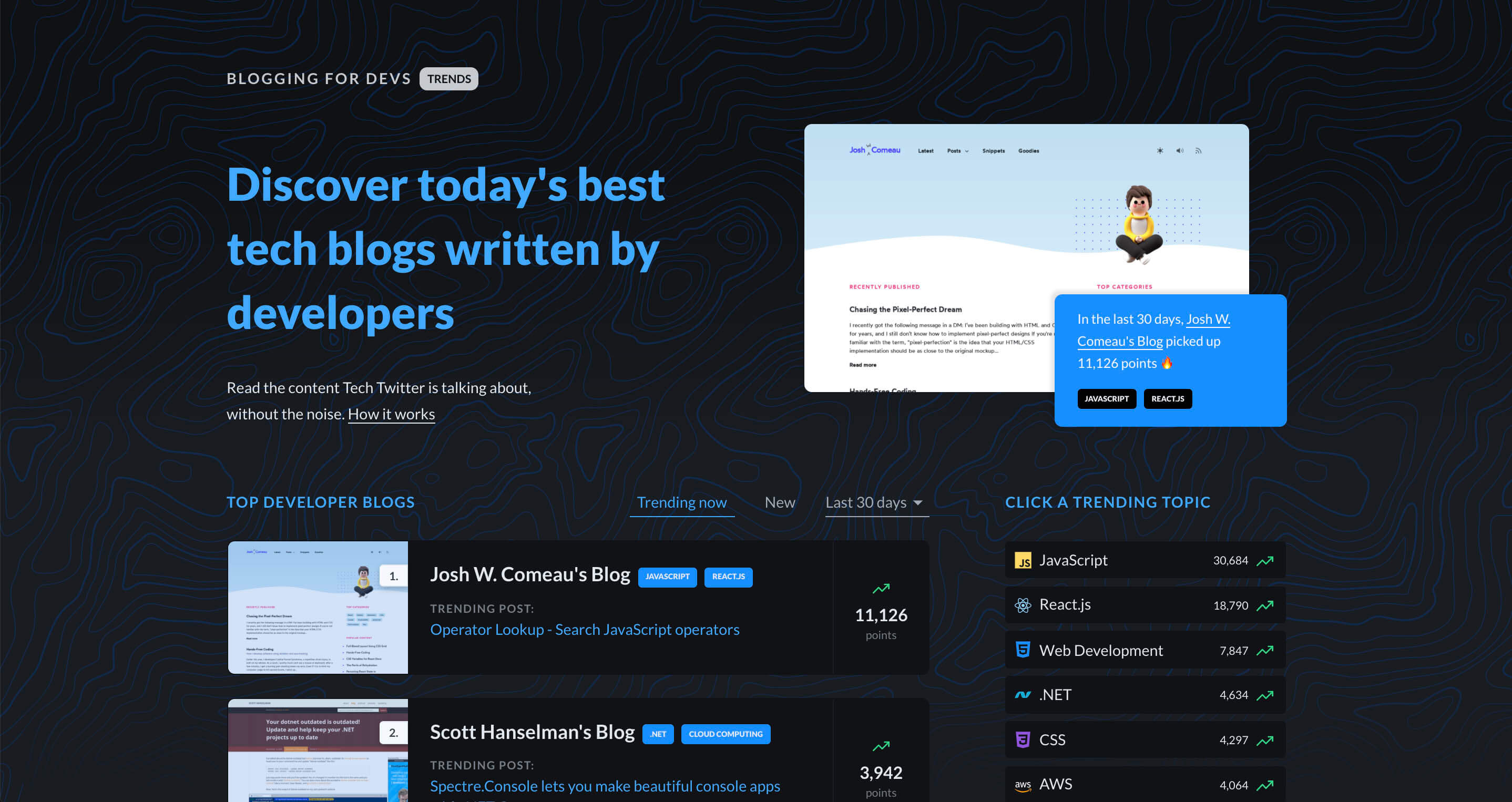
We've got articles covering the best blogs about JavaScript, web development blogs, and blogs on tons of other topics and tech stacks.
This isn't so different from how Pieter Levels started NomadList: by ranking locations by digital nomad friendliness. His website has over 5.7K referring domains.
Another example in the wild of "ranking something to become a reference point" is Nathan Latka's database of top SaaS companies.
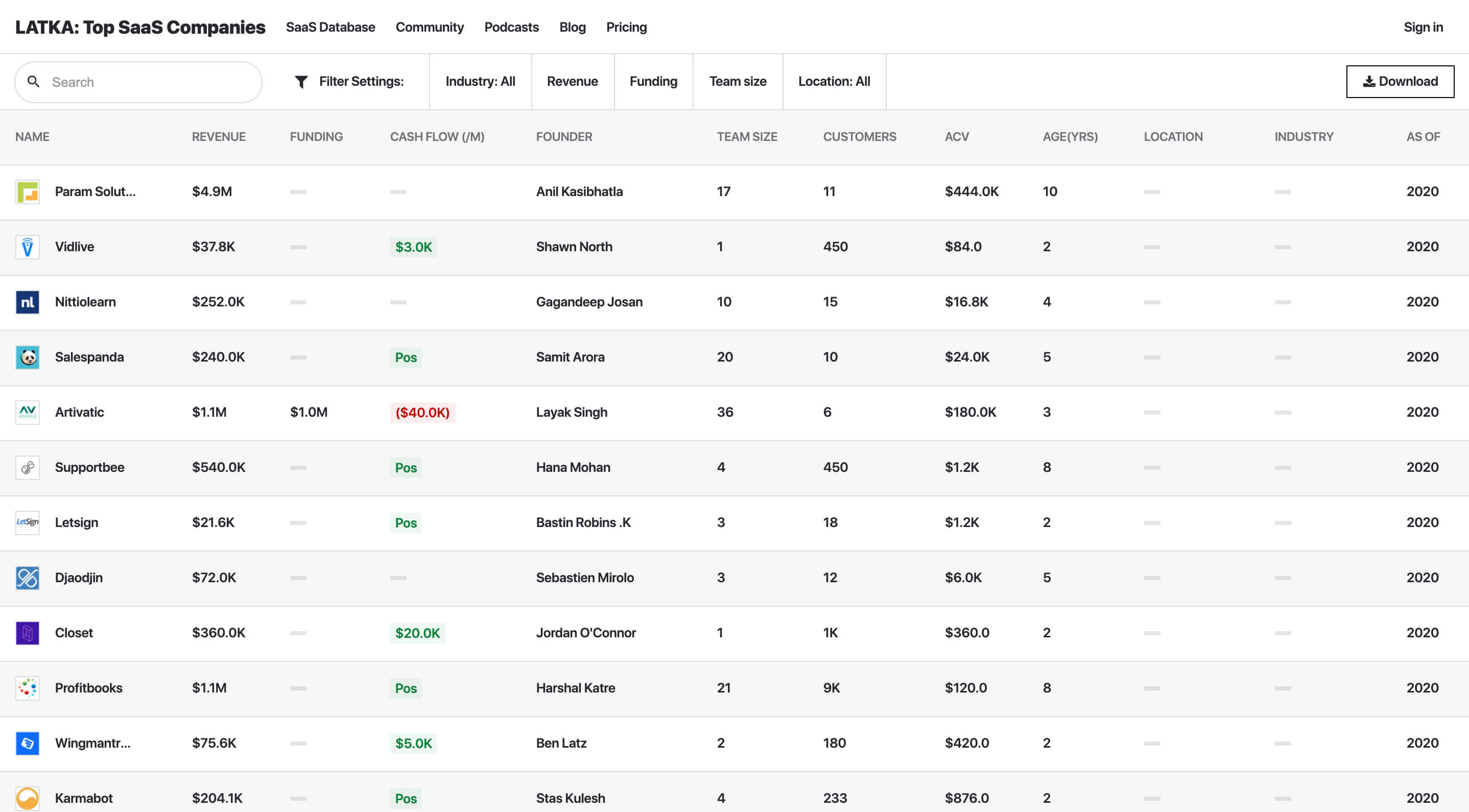
Like Nathan, once you have the data in hand you can write more link-worthy content on the blog that references that information, too. As I mentioned earlier, people love data.
How to turn the strategies in this article into an infinite list of backlink ideas
The best links (and the ones that are hardest for your competitors to replicate) are the ones that come from out-of-the-box thinking.
Some of the strategies I've mentioned here are common knowledge, like replicating your competitors' backlinks or pitching to reporters on HARO.
Others I've never seen mentioned before, like hosting your own conference talk slides or building standalone code generation tools for tedious coding tasks.
But rest assured, you can take almost any of these strategies and mix and match them. For example:
- Create a directory site of the best CSS code generation tools
- Feature someone else's Twitter poll in an article and tell them about it
- Start your own podcast for your SaaS and feature your customers, who will likely link to you from their personal websites
- Respond to link builders trying to get irrelevant link insertions like Toptal and ask them for something in return like a link from another property they operate, a 2-for-1 deal, or change the conditions entirely
You get the idea. You just have to put in the effort to make it a reality.
The most important strategy for building powerful backlinks (you're probably going to hate)
You are going to hate me when I tell you what it is, because it's probably the thing that developers dislike the most about their career in tech.
And that is this:
YOU HAVE TO START NETWORKING.
Or, said like a human instead of a LinkedIn advert, you have to start building relationships with your fellow humans in tech. Especially people that "do stuff" and have websites and projects.
Want to know how important networking is for getting backlinks?
Most outbound links on this page are to people I've personally corresponded with over email or Twitter.
That's how they got on my radar. That's why their website or resource comes to mind when I write. That's why I don't have to open Google, type a keyword, and give more links to the article that's already ranking number one.
Not that this new website is going to move the needle for them right away, but as I'm slowly building links to this site, they will eventually benefit from that as well.
Links don't happen by accident
Especially if you are just starting out and you're not a VC-backed startup with a PR team sending press releases to major tech publications like TechCrunch and The Verge.
You will have to earn your links by working for them.
To summarize the key themes across the strategies I've laid out in this article:
- Network and collaborate with people who can link to you from their own projects and websites.
- Make yourself visible through joining podcasts, speaking at conferences, being interviewed, and offering testimonials.
- Create interesting content and useful, free projects like blog posts and apps with viral, sharing, linking potential and doing so in public.
- Promote and link to others through curated rankings, integrations, and listicles and letting creators and companies know you're talking about them.
- Take advantage of being a developer! Don't stop at blog posts when creating link-worthy content. You can create and iterate faster than most companies.
I'm certainly not a renowned expert on link building, but I can say that these are strategies that have worked and continue to work for me — both as an individual developer and a bootstrapped founder.
How to start networking for link building opportunities
If you're interested in collaborating and building links to your website, I suggest applying to be a member of the Blogging for Devs Community. It's an invite-only community of developers who blog where you can learn from expert bloggers and devs on the same journey as you.
To become a member, you should be kind, helpful, not spammy, and ideally doing interesting things. If that sounds like a good fit, we'd love to have you!
Is link building worth it?
If you've made it to the end of this article, you've just read over 8,000 words about link building. Congratulations, you have a longer attention span than 99% of people on the internet (I'm not being sarcastic, that's both a virtue and a made-up statistic).
As I write this, I'm sitting by myself in my Airbnb in Lisbon, Portugal after spending three solid days writing this article.
I'd show you what it looks like out my window, but it's 11:29PM on a Sunday evening and the city is dark and the photo would be terrible.
I'm tired, and maybe you are too.
It wouldn't surprise me to hear you're feeling a bit overwhelmed or unsure where to start, or even if all the hassle is worth it.
Like a lot of things in life (yes, we're getting philosophical for a second), link building isn't about getting a quick win, especially if you're doing it all yourself for your own projects.
The best results come from a consistent effort over time.
But if you stick with it, you will get SEO benefits from link building, as well as opportunities to connect with people, get involved with events, create cool and impactful things that people enjoy using, and learn more about how the tech industry works from the inside (for better or worse).
As a developer, the results will likely impact not just your rankings in Google, but the trajectory of your career or the product you're building. You might be surprised.
Thanks for reading, let's get some links :)
Want to learn how to grow your blog without being a Twitter celebrity?
Take my FREE 7-Day Blogging for Devs Email Course and learn how to grow your blog without an existing audience (!) through great writing and SEO.
Join over 7,415 developers growing their blogs now:
Learn how to grow your blog as a developer without an existing audience through great writing and SEO.
